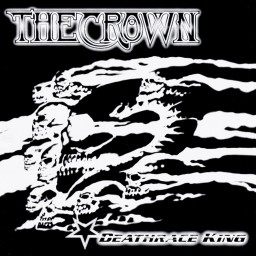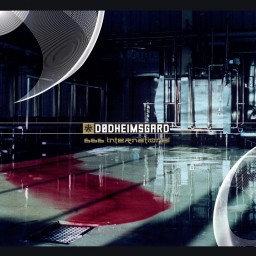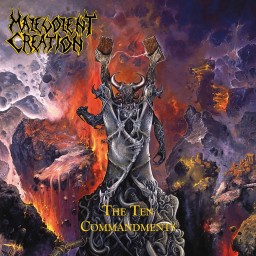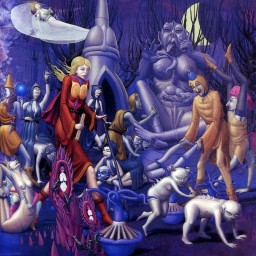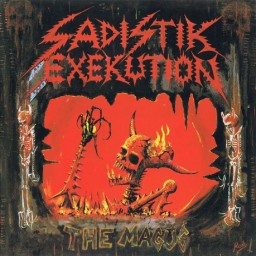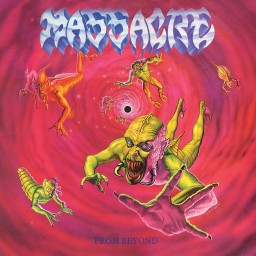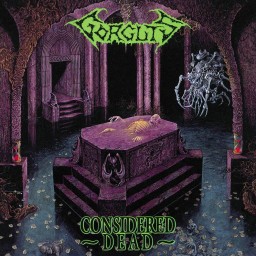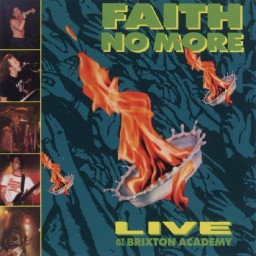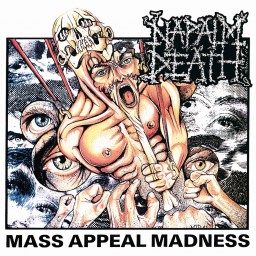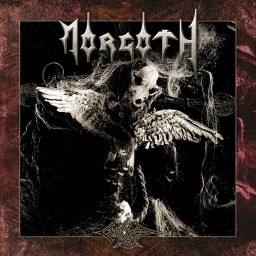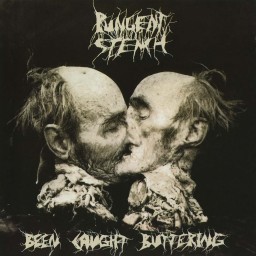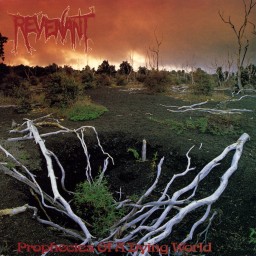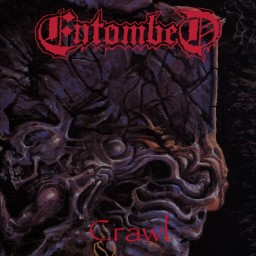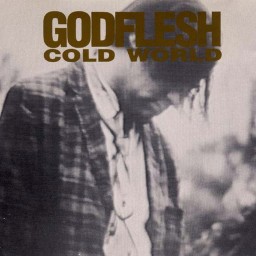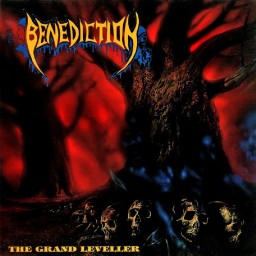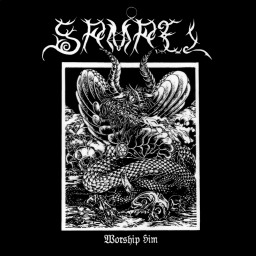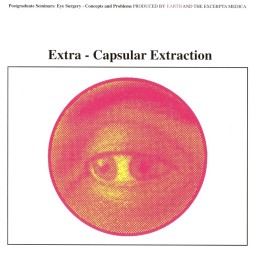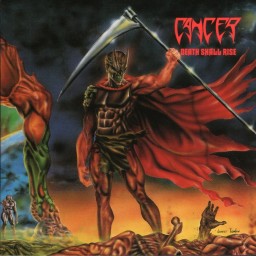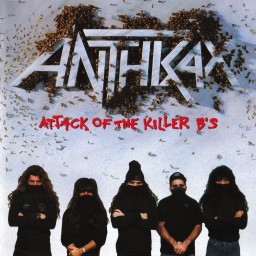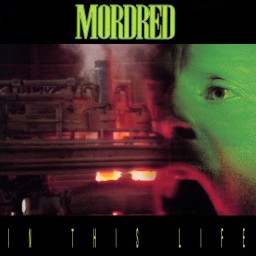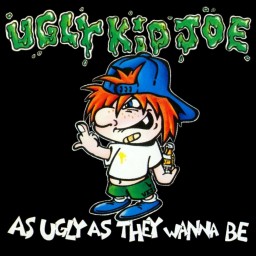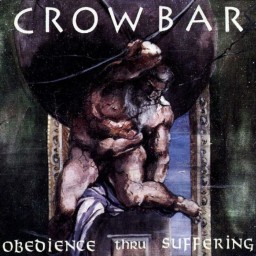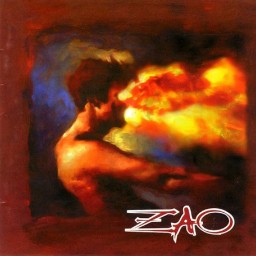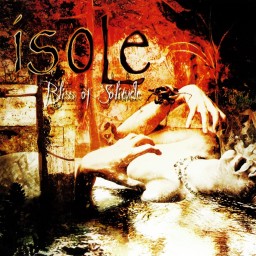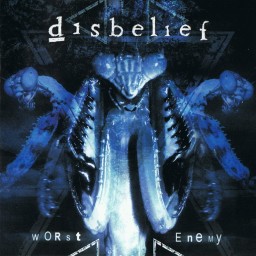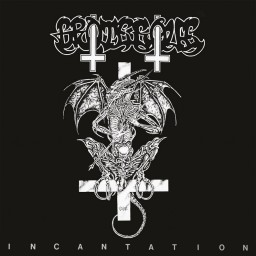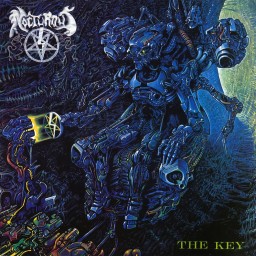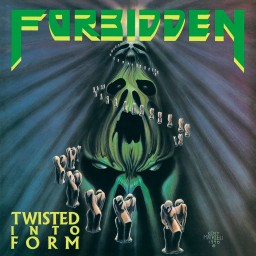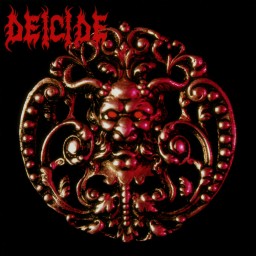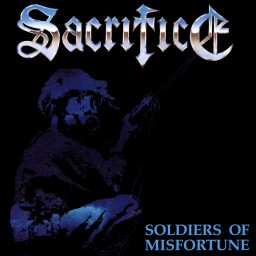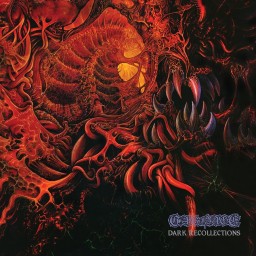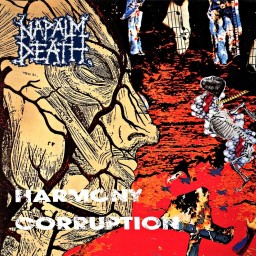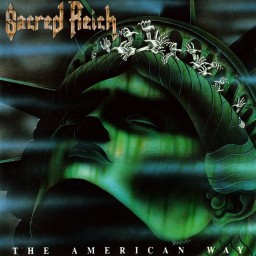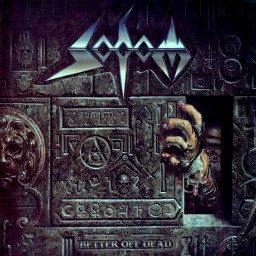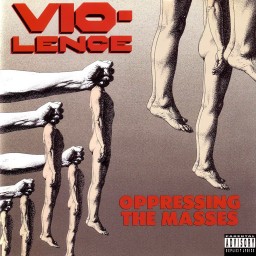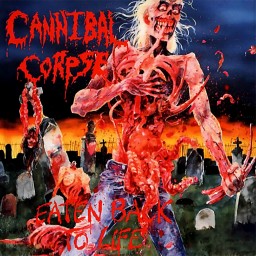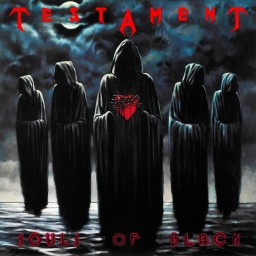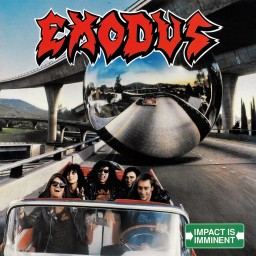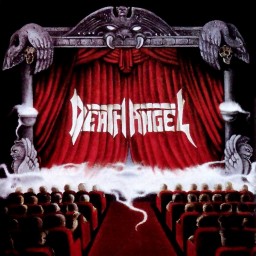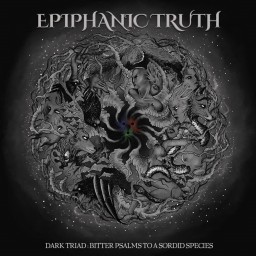Daniel's Reviews
I first got into Swedish extreme metallers The Crown back in the mid-1990's. They were still called Crown of Thorns at the time I picked up their first two albums through the tape trading scene & I had time for both of them too, particularly a track called "The Lord of the Rings" from their debut album "The Burning" which became somewhat of an anthem for me back in 1995. I wouldn't become aware of the band under their more well-known moniker of The Crown until my return to metal in 2009 & it would be through 2000's "Deathrace King" which is arguably the most well-known release from the band's lengthy 34-year career. I remember finding it to be a pretty entertaining listen too if I'm not mistaken & I've always thought of it as one of The Crown's better releases. I can't say that I remember all that much of it now though as I haven't felt like revisiting it since that first foray which may be a telling fact in itself but we're about to find out.
I always thought of Crown of Thorns as a death metal band back in the day but "Deathrace King" sees The Crown expanding their horizons significantly by exploring a number of other subgenres in a tracklisting that jumps around a fair bit from a stylistic point of view. The record kicks off in really strong fashion with three of the first four songs sitting amongst the stronger inclusions of the eleven on offer & daring the listener to resist the urge to thrash around like a madman. The rest of the album is a little more hit & miss though with a couple of songs even missing the mark altogether (see the fairly flat death/speed metal of "Rebel Angel" & disappointing thrasher "Blitzkrieg Witchcraft"). Mid-paced groove metal stormer "Dead Man's Song" is probably the only track that sees The Crown upping the ante to somewhere like the levels they began the record with which is unfortunate given the promising start. I wouldn't say that there are any genuine classics here though so "Deathrace King" was never really pushing for my higher scores anyway.
The mishmash of sounds present at various times during the 49-minute run time includes thrash metal, death/thrash, melodic death metal, groove metal & speed metal but I'd suggest that the death/thrash tag is the best representation of what you can expect to hear overall. The couple of melodic death metal inclusions ("Back From The Grave" & "I Won't Follow") see me reminiscing about the band's earlier 1990's material & will no doubt remind some of you of fellow Swedes like At The Gates & Dimension Zero while the thrashier & groovier songs play in similar spaces to another group of countrymen in The Haunted. The couple of speed metal numbers take more than a few queues from German Motorhead disciples Sodom so I often find myself wondering if The Crown were experiencing a bit of an identity crisis at times as they seem to struggle for a bit of focus. The level of musicianship certainly doesn't suffer for it though & I particularly enjoy the blast-beats of drummer Janne Saarenpää.
I have to say that I've been a touch underwhelmed by my revisit to "Deathrace King" as I remembered it a little more fondly than my current day experience has portrayed. The Crown certainly hint at greater things here but never really reach the levels of the premier acts floating around the scene. I often find the better songs to have magnificent parts but rarely see them maintaining those sort of levels for a full track. Perhaps I'm not as into some of the subgenres that are toyed with as other fans might be & that's likely having an impact on my score but I can't help but feel that "Deathrace King" sits more comfortably in the third tier than it does the second which means that I'm probably not very likely to return to it in the future even though I've found it to be a generally enjoyable experience.
Genres: Thrash Metal
Format: Album
Year: 2000
I perhaps don't enjoy "666 International" quite as much as I did when Ben first brought my attention to it fifteen years ago. I'd describe it as being an avant-garde industrial black metal release that combines the industrial black metal sound of Thorns with the avant-garde metal of Ved Buens Ende.... & throws in a little Aborym for good measure. It's certainly a very interesting record that perennially keeps you on your toes but it's also a flawed one in many ways. You see, there are just so many ideas floating around but not all of them work from a compositional sense with the outcome sounding noticeably pieced together from widely disparate parts. It also sounds to me like an intentional attempt to sound weird rather than a natural creative evolution. The black metal components are unsurprisingly my favourite sections while a couple of the piano interludes representing the weaker moments. The vocals of Thorns/Zyklon-B front man Aldrahn are certainly pretty psychotic but he also overdoes it a little bit at times & comes off like a raving madman. The production is a little inconsistent with the guitar sound being pretty thin & the electronic drums sitting further back in the mix than I would normally like with an industrial metal release. I do really enjoy the gothic rock influences though & would have liked Dødheimsgard to have explored those a little further. My favourite tracks are opener "Shiva-Interfere", the blackened "Sonar Bliss", the lovely piano interlude "Magic" & the gothic rock hidden track but none reach classic status which leaves me with a middling score overall &, even while I generally find myself enjoying the album, I can also see why I haven't felt the need to return to "666 International" or explore Dødheimsgard's subsequent material over the last decade or so.
Genres: Black Metal Industrial Metal
Format: Album
Year: 1999
Buffalo death metallers Malevolent Creation were a pretty big band in my household back in the early-to-mid 1990's. Both of the band's first two albums were very positively received by both Ben & myself & I feel that I perhaps even rated them a little more highly than many of my peers did due to their very close stylistic alignment with my own personal taste profile during that period. 1991's "The Ten Commandments" was certainly a little thrashier than 1992's wonderful "Retribution" sophomore record but the production & general feel fall firmly into the Florida death metal bracket with some polished performances, sophisticated arrangements & an aggressive tone which perhaps isn't too surprising when you consider that the album was recorded with legendary Florida death metal producer Scott Burns at the iconic Morrisound Studios.
While "The Ten Commandments" is unquestionably a death metal release, the thrash influence I mentioned is obvious throughout & it gives the record a slightly different vibe to Malevolent Creation's more dark & deathly sophomore album. The vocals of front man Brett Hoffmann aren't quite as deep as other death growlers & wouldn't sound all that out of place on a Sadus record to tell you the truth but they're extremely effective nonetheless & are one the album's clear strengths in my opinion. The instrumentation is often pretty thrashy too & sees Malevolent Creation combining the death metal of Deicide & Cannibal Corpse's 1990 debut full-lengths with some of the more brutal thrash metal releases like Dark Angel's classic "Darkness Descends" or Demolition Hammer's first couple of albums. As many of you would likely know, I'm a big fan of well-executed blast-beats & drummer Mark Simpson does a stellar job at producing a super-tight battery of flailing snare-drum hits here which appeals to me greatly. He doesn't overdo it though which gives each blast-beat section added weight & emphasis. The guitar solos of Jeff Juszkiewicz are pretty accomplished for such a young band too so Malevolent Creation were a highly professional act for the time.
"The Ten Commandments" is a very solid release that should please all fans of US death metal. It's only lacking a few more genuine classics with the savage "Premature Burial" being the only cut that I'd place into that category. The rest of the material is consistently strong though so it's hard to be too critical, particularly for a debut release. "Retribution" would see Malevolent Creation stepping up to the next level though & it's always been my pick of their back catalogue. Regardless, "The Ten Commandments" comes highly recommended from this ol' death metal nut.
Genres: Death Metal
Format: Album
Year: 1991
I can still recall the first time I heard about English doom/stoner metal legends Cathedral. I was reading a Terrorizer magazine interview with Napalm Death that was conducted while they were out on tour back in 1991. The band were questioned on what they'd been listening to on their tour bus which saw one of the guys admitting that Death's "Human" had been the popular choice until they'd received a copy of their former vocalist Lee Dorrian's first full-length with his new doom metal band Cathedral, a release sporting the trippy title of "Forest of Equilibrium". I was very surprised to read that Cathedral's record had overtaken "Human" as the new bus favourite, particularly given that "Human" had already become somewhat of an obsession for me. I subsequently made a point of seeking out "Forest of Equilibrium", purchasing it on cassette shortly afterwards.
The sound & aesthetic of Cathedral's debut can be quite confronting upon first listen. The cover artwork is nothing short of stunning with its strong psychedelic focus being perfectly suited to the retro vibe Cathedral were going for. The production job took me a little more getting used to though as it sat well outside of my metal comfort zone with the fuzzy, bass-heavy timbre recounting 1970's progressive rock & heavy psych as much as it does early Black Sabbath, the prog rock component being further hinted at through the use of a couple of brilliantly effective flute solos that afford additional colour to the release. After a couple of attentive listens I found myself becoming captivated by this sound & committed more & more time to indulging in the material.
"Forest of Equilibrium" is renowned as being easily Cathedral's doomiest album & I'd also suggest that it was their best by a pretty wide margin too. The dedicated focus to making their particular brand of doom metal the slowest, heaviest & most melancholic ever recorded was a rousing success in my opinion & I still find myself turning to this record when chasing some truly depressing doom metal atmosphere to this very day. It's not a perfect album by any means though. The occasional hints at the stoner metal sound the band would quickly progress towards over their next couple of releases do taint otherwise strong & muscular efforts like opener "Commiserating the Celebration" a bit while I also find the sporadic use of chuggy heavy metal riffs to be more of a distraction than it is a refreshing change of pace. Then we have the ever-popular & super-groovy stoner metal single "Soul Sacrifice" to contend with too, a track that I've always found to interrupt the flow of an otherwise extremely strong tracklisting. Thankfully though, the highlights are nothing short of devastating with doom monster "Ebony Tears" (also the highlight of 1990's "In Memoriam" demo) & closing funeral doom precursor "Reaching Happiness, Touching Pain" being absolute master strokes & the outstanding "Serpent Eve" & "Equilibrium" not being too far behind.
At this point I probably should address the elephant in the room as it becomes pretty damn obvious as soon as any Cathredral virgins enter into their first listen. Lee Dorrian (also of drone metallers Teeth of Lions Rule the Divine & doomsters With The Dead) wasn't the most capable of singers while he was leading Napalm Death but here we see him sporting a delivery that is the very definition of an acquired taste. Some punters simply won't be able to come to terms with Dorrian's miserable howl & I can't deny that he can even annoy me too but it's almost impossible to deny that this music seems to be tailor-made for his depressive wallowing. The heavily down-tuned & harmonized doom melodies of former Acid Reign guitarists Gaz Jennings (also of English heavy/doom metallers Death Penalty) & Adam Lehan more than make up for any discomfort experienced due to the vocals though as there are some absolutely crushing doom riffs on display here. In fact, I'd suggest that I've rarely heard anything heavier in all my days which has seen "Forest of Equilibrium" sitting in elite company for the more than three decades since it was first released. The fuzzed-out lead licks are produced in an interesting way that sees them flying out from unexpected places in the mix &, in doing so, gently massaging your cranial cortex in a similar way to the greats of 1970's heavy psych. The spectacular success of these elements has no doubt contributed to the long-time frustration I've held around Cathedral given that they'd never again touch upon such a transcendent sound, often making a conscious effort to steer away from it & even hinting that they may have recorded another album in this style that was simply rotting away in someone's basement. 2013's "The Last Spire" swansong would finally see Lee & co. attempting a purist doom record again, & with some very solid results too it has to be said, but I can't say that it reaches the same dizzying heights (or should I say soul-crushing lows?) as this wonderful release managed to.
"Forest of Equilibrium" is a marvelous debut & should certainly be essential listening for any doomster worth their salt. It proved to be the perfect gateway between the traditional doom metal of the 70's & 80's (e.g. Black Sabbath & Trouble) & the more modern doom sound of the 90's that saw all peripherals & external influences being cast aside in the name of a more focused & pure doom sound (e.g. Electric Wizard). The "In Memoriam" demo is possibly even more heavily focused on undiluted doom & I've been surprised to find myself giving it a slight edge over "Forest of Equilibrium" in recent times but I can't deny my affection for this record which easily overcomes its shortcomings by taking its craft to the ultimate extreme &, in doing so, achieving genre-defining results.
Genres: Doom Metal
Format: Album
Year: 1991
I can still vividly recall the first moment I became exposed to legendary Sydney extreme metal establishment Sadistik Exekution. It was 12th August 1992 & I’d arrived super-early to the Morbid Angel show at the Enmore Theatre so that I could achieve the greatest vantage point for the band that I regarded as being probably my favourite act at that point in time. Surprisingly, I’d managed to situate myself right in the middle of the front row of seats so I was literally only a metre away from the stage. Melbourne deathgrinders Necrotomy opened proceedings & did an admirable job at warming me up for what was my very first international death metal show. What they didn’t prepare me for was the band the followed immediately after them though with Sadistik Exekution giving me a new appreciation for what an extreme metal stage show could be. I’d never experienced anything so completely over the top & it was very hard for a young guitarist like myself not to be left in awe of the pure bad-assery of notorious top hat-wearing shredder Reverend Kriss Hades when he was so close that I could almost touch the blood dripping down his forearms due to the line of bobby pins he’d inserted through them prior to the show, his axe neck looking more like a skeletal spinal chord than an instrument & his fingers flying over the fretboard at previously unrecorded speeds. I’d very quickly realise that the Sydney audience had a love affair with these four nutters that I didn’t fully understand at the time but I’d certainly get my chance to understand it over the years that followed.
Shortly afterwards, buoyed by my experiences at what I still regard as the greatest metal show I’ve ever witnessed, I’d start my very own death metal band & we’d go about building a repertoire & a presence in the local scene. It would be a couple of years before we’d be mixing it with the in-crowd of Sydney metal but I'd eventually find myself being introduced to the Sadistik crew a their entourage of rabid worshippers. You see, Sadistik are an absolute enigma in this country with their music playing second fiddle to the circus sideshow of antics & personalities & young metalheads just seem to lap it all up. Sadistik shows were few & far between but when they did take place you would see all of the old faces coming out of the woodwork with most of them getting completely shit-faced along the way. It was at one of these early-to-mid 90’s Sadistik shows at the Lewisham Hotel that I’d meet bassist Dave Slave for the first time & he’d present me with a copy of “The Magus”, Sadistik Exekution’s debut full-length which was supposedly recorded around 1988 but failed to see a proper release until 1991. It was a release that I’d find was all around me over the next five years given its significance to the Aussie scene &, looking back at it from the outside, it’s perhaps a little easier to see why. My relationship with Sadistik Exekution would become closer during the middle of the decade once I started a three-year relationship with one of Dave Slave’s close friends & I can recall many a drunken conversation with the various band members over the years that followed. They were mostly gentle, lovely guys who were almost unrecognisable from the pure insanity of their music & (particularly their) stage shows.
So... this brings us back to “The Magus” which, if it really was recorded back in 1988, would have to have been some of the most extreme metal music in the world at the time. The production job is generally of demo quality & there’s a fair amount of variation in sound quality between the various tracks so it would seem to be pretty likely that it was recorded in multiple sessions. That aesthetic definitely suited Sadistik’s attack though so I wouldn’t see that as a negative. As with most of the extreme metal of the late 1980’s, the material crosses over between the full gamut of extreme genres with death metal, thrash metal & black metal all playing their part in a result that I think is best described as blackened death/thrash. The remnants of iconic Sydney demo band Slaughterlord are still easily visible in the muddy riffs & rapid-fire lead guitar work of Sandy Vahdanni while Dave Slave’s light-speed bass playing is given plenty of room in the mix to cause devastation. Sloth blasts away on his kit with a rare intensity for the time as the consistent use of blast beats within death metal was still yet to be seen in 1988. It’s ring-leader & front man Rok who steals the show though with his vicious delivery making for the perfect foil for the rough-&-ready Sadistik Exekution instrumentation.
“The Magus” jumps around a bit from a stylistic point of view. The tracklisting opens with a well-executed dark ambient piece entitled “Transneobathasaurikaldelusionsoftheunknown” before hurling itself into a full-on death/thrash frenzy via the very solid “Cautness Darling Blood”. The title track lifts the intensity even further & is one of the best tracks the band ever produced in my opinion. I’d even suggest that it traverses similar sonic territory to war metal bands like Blasphemy & Bestial Warlust which is significant when you consider that Blasphemy’s legendary “Blood Upon The Altar” demo was still another year from seeing the light of day when/if this was recorded back in 1988. “Agonising The Dead” sees Sadistik adding a blackened atmosphere to their death/thrash attack but the quality takes a step back at that point with the production turning a bit thrashier & the band’s death/thrash sound being a little more traditional, if not for the greater emphasis on blast beats. I consistently find myself reaching for comparisons with Brazilian black/thrash metallers Sarcofago during a lot of that material but things take a drastic turn for the final two tracks though with both taking the form of doomy black metal dirges. Interestingly, it’s the hidden track “Spirits Are Coming” that I find to be my favourite on the entire album as it presents an unhinged darkness that seems a little more serious than a lot of Sadistik’s more ridiculous material & leaves me feeling a strangely pleasant & transcendent feeling of squeamish uncomfortability.
There’s little doubt that the 35 minutes duration of “The Magus” is quite an experience for even the more seasoned extreme metaller with a lot being crammed into the relatively short run time. Some of the performances can get pretty sloppy at times but this can easily be forgiven when you consider the sheer intensity on display. The faster tracks leave me feeling like my hair is flying back behind me as my face is attacked by a tsunami of extremity which gives even the less significant material through the middle of the tracklisting more weight than it might appear to have on the surface. All of this amounts to the best Aussie metal album to see the light of day up until 1991 in my opinion & I don’t think that position is being impacted by any past relationships or experiences I may have had with the band as a young, starry-eyed youth. I've often seen the music of Sadistik Exekution playing second fiddle to rumours & legend but, even if many of the stories are true, their music has enough meat on its bones to justify your attention in its own right.
Genres: Death Metal Thrash Metal
Format: Album
Year: 1991
Florida death metal outfit Massacre have always maintained somewhat of a legendary status within death metal circles, primarily off the back of the undeniable pedigree that their list of current & former band members holds as well as the stories around front man Kam Lee having been the inventor of the death metal vocal tool we so lovingly refer to as the "death growl". This makes it a little more interesting that I’d honestly never heard of them prior to their 1991 debut album “From Beyond” hitting the streets. I’d quickly rectify that oversight by purchasing a copy of “From Beyond” on cassette shortly after it was released & giving it repeated return visits in the hope of discovering the true magic that many people claimed it to contain. I’m not sure I ever quite stumbled over the full breadth of Massacre’s appeal though & “From Beyond” has kinda been one that I’ve remembered as a pretty fun release that’s lacking a bit in the depth department. This week’s revisit has been about rekindling my fire for the album & seeing if it really has what it takes to compete with Florida’s finest.
The production job & artwork certainly don’t hurt Massacre’s chances of drawing the attention of your average old-school death metal fan as the record looks & sounds like something that’d appeal to the target audience with a shredtastic rhythm guitar sound & an attractive & gnarly (even if it is pink) cover image. A lineup including ex Mantas/Death drummer & current The Grotesquery front man Kam Lee, former Mantas/Death & current Left To Die guitarist Rick Rozz, former Death/Six Feet Under & current Obituary/Left To Die/Inhuman Condition bassist Terry Butler & former Death drummer Bill Andrews certainly doesn’t hurt Massacre’s cause either as they clearly possessed a strong death metal pedigree, even more so when you consider that Obituary/Six Feet Under axeman Allen West was a former member too. But if you look at that lineup with an unbiased & impartial magnifying glass, you can also see the limitations that stop Massacre from achieving a higher position in my Florida death metal hierarchy.
Hhhmmmmm... it's sounding like ol' Daniel's gonna pull out some constructive criticism here, isn't it? But let’s not paint Kam Lee with that brush as his vocals are excellent on “From Beyond”. Lee really proves a point here with a muscular & aggressive performance that I'd suggest is the clear highlight of the Massacre sound. It’s more in the instrumental contributions that we find the limitations I was referring to. You see, Massacre opt for a VERY straight-forward brand of death metal indeed. There’s no doubt that they do it exceptionally well but I do still find myself craving a little more… I dunno… class perhaps? Rick Rozz’ riffs are certainly tightly performed but I do have to say that they’re very basic in their makeup & would sound a lot like generic thrash metal if given a traditional tuning & a different guitar tone a lot of the time. As with former band mate Allen West, Rozz’ guitar solos have always been built around the heavy (over)use of whammy bar histrionics rather than any sort of melodic composition too & you’ll rarely find a better example of that than we do here. And then, the rhythm section of Butler & Andrews have never been known for their musicality either, have they? Both have pretty much built their careers on providing simple yet rock solid beats that accentuate the riffs of the guitarist(s) & that’s what they do here too.
Now, that might sound a little negative but in truth the tracklisting on “From Beyond” is completely blemish-free. It’s the lack of any truly mind-blowing death metal anthems that’s the limiting factor here. Only opener “Dawn of Eternity” & the very solid “Succubus” come closest to meeting a top tier Florida standard but both see their potential capped out by their sheer simplicity. The song-writing is certainly catchy as the structures are quite traditional & the choruses usually just repeat the song-title so I find myself enjoying the ride but rarely feeling like the music is commanding me to go all in. The potential for those sort of feelings is perennially curtailed by just how meat-&-potatoes “From Beyond” is to tell you the truth. I can’t see that being a significant issue for a lot of the death metal fanbase (& it clearly isn’t based on the general feeling on “From Beyond”) but it appears to be for me.
Don’t get me wrong, “From Beyond” is a more than decent representation of the death metal model. It’s just not a great one in my opinion so I don’t place it on the same lofty pedestal as the work of Massacre's main competitors of the time (see Death & Obituary who both did this sound much better). Instead, I feel like we're destined to eternally see "From Beyond" sitting in the middle rows with the Cancer’s & Benediction’s which isn’t necessarily such a bad thing. It’s perhaps just not in line with Massacre’s reputation, that’s all.
Genres: Death Metal
Format: Album
Year: 1991
Canadian death metal monsters Gorguts hit my radar in a pretty major way when I was thoroughly blown away by their track "Disincarnated" which appeared on a 1992 R/C Records compilation CD I'd picked up called "Rock Hard Presents Monsters of Death". It was a rip-roaring compilation album from memory so the fact that Gorguts were able to stand out amongst such illustrious company was a major feather in their caps. I'd subsequently go about picking up their debut full-length "Considered Dead" on CD at my earliest convenience & was immediately drawn to Gorguts' purist death metal sound.
"Considered Dead" is often overlooked in the star-studded Gorguts back catalogue, mainly because it's such a simple record in comparison to the more experimental & technical releases that followed. Here we see Gorguts sporting a very similar sound to records like Death's "Spiritual Healing", Immolation's "Dawn of Possession" & Pestilence's "Consuming Impulse" & making a very good fist of it too it has to be said. The production job is perfect for this style of music with the guitars having that thick death metal tone & Luc Lemay's death growl sounding as potent as it ever has & representing the focal point of the band. The level of musicianship was already very high although there was still a little room for improvement in the overall tightness at times. I particularly enjoy the guitar solos & the occasional use of progressive riff structures which were very accomplished for a debut album in 1991.
What holds "Considered Dead" back though is the feeling that you've heard it all before. In truth, I slightly prefer it to records like "Spiritual Healing" & "Consuming Impulse" but it's simply come a little too late in the game to have the same sort of impact on the wider extreme metal scene. As it stands, "Considered Dead" has been relegated to the bench with the other also-rans & I feel that's a little harsh to tell you the truth as there's an awful lot of quality here. Perhaps the tracklisting could have done with a couple more standout tracks like the afore-mentioned "Disincarnated" or techy closer "Inoculated Life" but there's a clear class & consistency to it which makes it an essential part of Gorguts' back catalogue nonetheless. Hell, I'd even take it over 2000's ultra noisy & experimental "Obscura" album if I was forced to choose between the two which is probably a representation of my personal taste profile more than anything else. Classic death metal fans are unlikely to be disappointed with "Considered Dead" but it's also unlikely that it'll change their worlds like the greatest releases of the genre.
Genres: Death Metal
Format: Album
Year: 1991
San Francisco alternative metallers Faith No More played a really big role in the teenage lives of both Ben & I. I first became acquainted with their 1989 third album "The Real Thing" when my best mate at high school purchased it off the back of the outstanding "Epic" single & both of us would soon find ourselves indulging in Faith No More's short discography over the coming months. "The Real Thing" would go on to not only maintain its position as my favourite Faith No More release to this day but also to challenge Alice In Chains' superb "Dirt" album for top honors in the field of alternative metal overall. The acquisition of talented front man Mike Patton had proved to be a masterstroke as he clearly gave them the greater level of accessibility they were searching for after struggling to connect with a wider audience due to the inconsistencies of former singer Chuck Mosley. The band's 1985 debut album "We Care A Lot" was a wishy-washy affair that I found myself struggling with but I have to admit to having a significant soft spot for their 1987 sophomore album "Introduce Yourself" which ended up being an acquired taste, buoyed by the arrival of iconic guitarist Jim Martin. The "Live at Brixton Academy" live album was a bit of a strange decision when you consider that Faith No More had only just cemented their classic lineup & broken through in the commercial market but it's perhaps not surprising that their management would be looking to capitalize on their newly found success while they waited for the next proper full-length to eventuate.
"Live at Brixton Academy" is very much a showcase of the strengths of "The Real Thing" as an album with only one of the eight live cuts being taken from the Chuck Mosely records but even then we find Faith No More's early anthem "We Care A Lot" sounding better for the charm & charisma of Patton. The rest of the live material is composed of the stronger cuts from "The Real Thing" as well as versions of the two CD-only tracks in Black Sabbath cover version "War Pigs" & piano rock crooner "Edge of the World". The tracklisting is closed out by two studio B-sides from the recording sessions for "The Real Thing" in Jim Martin's fairly disposable bluegrass instrumental "The Grade" & the very solid alternative metal number "The Cowboy Song" which was a welcome addition that may make the release a touch more worthwhile for those that find a live album of this type to be a little self-indulgent. And let's be honest, it IS a bit self-indulgent to think that a live release was necessary when you plan to draw the bulk of the material from the one studio record.
The elephant in the room here is certainly the production job though as it's fair to say that it's not terribly amazing. In fact, it's not all that far above bootleg quality if we're gonna get serious about it with Martin's guitars being noticeably absent in the mix which isn't the greatest attribute for someone like myself whose prime attraction to Faith No More stems from Martin's contributions. Thankfully though, the material is just so fucking strong that "Live at Brixton Academy" still manages to overcome its technical deficiencies to remind me of just how much I love this band. They really are a collection of super-talented individuals in their elected fields & when they come together creatively they possess the ability to write some of the most enthralling & inspired metal music you'll find. The title track from "The Real Thing" is a prime example of that as it easily overcomes the production issues to cement itself as the highlight of the album which is no mean feat given the challenges put forward by classic songs like "From Out Of Nowhere", "We Care A Lot" & "Zombie Eaters". The imperious "Epic" & the ever-popular "Falling To Pieces" aren't quite as effective as some of the deeper cuts to be honest but that's really a reflection of the quality on offer more than anything else.
The previously mentioned "The Grade" is the only creative misstep on "Live at Brixton Academy" which represents somewhat of a flexing of Faith No More's muscles as a formidable musical force although I do have to question the decision to close out the live set with "Edge of the World" which was never one of the band's stronger works & allows the energy levels to drop a bit. I'm not gonna lie & tell you that the production issues don't bother me because they do but they don't stop me from becoming emotionally involved with the music either. How much of this is due to nostalgia is difficult to pinpoint but that's not really important because a rating should be a reflection of one's personal connection with a release & there's very little doubt that I connect with this one. Perhaps "Live at Brixton Academy" is not an essential release for every member of The Gateway but it is one for me & I can't deny the buzz that these ol' bangers still provide me with.
Genres: Alternative Metal
Format: Live
Year: 1991
I have an admission to make. The early Napalm Death releases have never floated my boat as much as they have for others. I've always respected them for what they represent & can honestly say that I've found them to be universally appealing but I've never found them to be records that I feel like coming back to time & time again, despite having been introduced to them very early on in their career & during my more formative years. I'd probably had a good year or two with Napalm Death by the time 1991's short "Mass Appeal Madness" E.P. appeared as I'd bought all three of their albums prior to its release so I'd certainly given them a fair chance but I wouldn't find myself enticed into laying out my hard-earned money for "Mass Appeal Madness", instead recording all of the songs individually off the radio over the first few weeks following its release. I remember having a bit of fun thrashing around my room to them too but I can't say that the (mass) appeal was long-lasting & I haven't returned to it in many years now. Given that I've recently revisited all of Napalm Death's earlier records in months gone by, it'd be remiss of me to overlook this one if only for some perspective.
"Mass Appeal Madness" is a four-song affair that was dedicated to the memory of recently deceased Atheist bass player Roger Patterson & includes two brand new songs in the title track & "Pride Assassin" as well as two re-recordings of songs taken from Napalm Death's 1988 sophomore album "From Enslavement To Obliteration" ("Unchallenged Hate" & "Social Sterility") which was their best full-length to the time in my opinion. It would also be the last Napalm Death release to feature legendary drummer Mick "Human Tornado" Harris who would leave to focus on mainly non-metal projects like Scorn moving forwards. That fact alone makes the E.P. somewhat of a turning point for the band given the impact that Harris had had on the Napalm Death sound that he'd virtually single-handedly defined on those early grindcore releases.
The short nine-minute duration means that "Mass Appeal Madness" is all over before you know it & this makes repeat listens very easy to accommodate. Unsurprisingly, the newer material takes on a slightly different stylistic format than the re-recordings with the title track & "Pride Assassin" being the more significant pieces which define the sound that "Mass Appeal Madness" will be remembered for. Both of those tracks take on a deathgrind sound that's not too dissimilar to that which we heard on the last album "Harmony Corruption" &, to a lesser extent, 1989's "Mentally Murdered" EP. The re-recorded tracks maintain their original grindcore sound only they've been given a slightly more deathly edge by the production & the vocals of former Benediction front man Mark "Barney" Greenway who had only recently joined the band for 1990's "Harmony Corruption" album. The change in approach between the two pairs of songs is subtle enough to pass the casual listener by without causing too much disruption but it also gives "Mass Appeal Madness" the opportunity to appeal to both the diehard grindcore fans as well as those that need a bit of death in their grind to add a touch more darkness. As a point of reference, I'd suggest that the E.P. sounds kinda like Terrorizer & Lock Up style deathgrind meets Terrorizer & Repulsion style grindcore.
The quality of the material is all more than decent with the four tracks possessing a solid consistency that makes it hard to pick out any clear highlights. If pushed I'd probably suggest that the title track would be my favourite, perhaps because it's the most lengthy & death metal-infused inclusion. There's not much between the four songs mind you so I can't see too many people losing interest along the way, particularly given the extremely short duration of the release as a whole. It's interesting that there's not all that many blast beat sections though which is a little unusual for Napalm Death & was a sign of things to come on future releases that saw them starting to expand their sound in a number of interesting ways over the next few years. I have to say that I do miss the blasting a bit & find "Mass Appeal Madness" to be at its best when it's at its most extreme. I guess I just don't think Napalm Death are as good at creating captivating tremolo-picked death metal riffs as some of the more premium death metal bands on the scene at the time & their groovier moments aren't really that well aligned with my taste profile.
Nonetheless, it's hard to be too critical of yet another respectable extreme metal release from one of the more important players in the underground & I can't deny that I've enjoyed the trip down memory lane even if I don't find myself recalling every single second of these tracks like I have with some of the other early 90's releases I've been revisiting of late. I tend to think that my higher scores for Napalm Death releases are still to come as I get stuck into their next few releases but it won't surprise me if I never quite get there. Deathgrind nuts should probably give "Mass Appeal Madness" a listen or two but I wouldn't expect to find your next holy grail.
Genres: Death Metal Grindcore
Format: EP
Year: 1991
I first came into contact with German death metallers Morgoth through late-night underground metal radio programming around 1990 when their early “Resurrection Absurd” & “The Eternal Fall” E.P.’s received the occasional airing. I really liked what I heard too so I’d quickly investigate the full releases & had no hesitation in chasing down Morgoth’s debut album “Cursed” through the tape trading scene as soon as it hit the shelves as well. “Cursed” offered a sound that was very much in line with my tastes at the time which saw it enjoying a whole bunch of repeat plays in my Walkman over the next six months or so. I honestly don’t know why I haven’t returned to it more often in more recent times but it’s time to find out so let’s see how it’s held up.
“Cursed” presents Morgoth as the professional, modern death metal outfit of the time with the cover art being superbly dark & the production job being spot-on. Stylistically, we see the band setting their sights on the Florida death metal model but giving it a slightly dirtier European edge. In fact, the obvious comparisons are with 1988-90 era Death & the first couple of Obituary albums as a lot of this material seems to jump from one to the other for inspiration. Chuck Schuldiner probably has the upper hand from an instrumental point of view but the vocals are exactly what you’d get if you combined Chuck’s rasp with John Tardy (Obituary) & Martin van Drunen’s (Asphyx) monstrous growling. The Obituary/Asphyx influences are clear in the doomier riffs & they represent a clear strength for the band while the occasional use of progressive riff structures has been very well received too. I have to admit that the lead guitar work is pretty primitive but the rest of Morgoth’s sound is dark, chunky & full of everything your average death metal nut looks for with the amazingly powerful vocals of front man Marc Grewe being the clear focal point. I absolutely love him to be honest. He’s quite simply one of the best in the business.
“Cursed” certainly didn’t muck around in reminding me of why I enjoyed it so much back in the day as the first two proper songs “Body Count” & “Exit To Temptation” are absolute belters & the best tracks on the record in my opinion. The quality drops a little from there but never gets below a really solid level that resides primarily in the top of the second tier of the death metal ranks. Put simply, “Cursed” is a high-quality conventional death metal record in the classic early 90’s style & if that sounds like you then I have no hesitation at all in recommending it to you.
Genres: Death Metal
Format: Album
Year: 1991
My awareness of Austrian death metallers Pungent Stench first kicked off around 1990 through their first two proper releases in the 1989 split album with fellow Austrians Disharmonic Orchestra & their 1990 debut full-length "For God Your Soul... For Me Your Flesh". I quite liked the split album but it was really the latter release that saw me being convinced as to Pungent Stench's credentials as anything more than a novelty act & my dubbed cassette copy received quite a few spins that year. My positive impressions of that album would lead me to purchase a cassette copy of the band's 1991 sophomore album "Been Caught Buttering" (I'm guessing a take on Jane's Addiction's hit song "Been Caught Stealing") shortly after release & I found it to be even more enjoyable than "For God Your Soul... For Me Your Flesh". It was also so shocking in its graphic lyrics & imagery that it made for a fantastic talking point with my non-metal-loving school mates who thought it was simply hilarious so there was definitely some added value for a young chap like I was at the time. My parents? Well, they found it a little less amusing but let's not talk about the fun police now, ok?
"Been Caught Buttering" offers some of the more notorious cover art you're ever likely to encounter & certainly makes the desired impression. The production is fairly muddy but that kinda suits a band like Pungent Stench now, doesn't it? I mean, you're not exactly looking for a super-clinical display of technical prowess when you listen to bands that represent the more fun side of misogynistic serial killing, are you? And that's very much what Pungent Stench were about. They were there purely to shock the listener into laughing & they did a very good job at it too. Song-titles like "Happy Re-Birthday", "Shrunken & Mummified Bitch" & "Splatterday Night Fever" are self-explanatory in their blatant disregard for your moral compass but what about their quality from a musical perspective? Well, I would argue that "Been Caught Buttering" showcases Pungent Stench at the peak of their powers in that regard as I still find it to be a captivating listen all these years later, despite the novelty having worn off decades ago.
The sound Pungent Stench were pushing back in 1991 contained a few different components, the first of which is a grimy old-school death metal sound that forms the basis for the record & reminds me very much of California's Autopsy. The band throw in a few moments of humor to break up their debauchery with the dead though & to remind you that this is all in name of good fun. There's a clear deathgrind influence on tracks like "Happy Re-Birthday" & "Sputter Supper" which are a little more savage in their assault on the senses & remind me of bands like Impetigo & Macabre. I tend to think of these moments as being a touch less appealing than the rest of the album as they seem a little more disposable than the Stench's more significant offerings. Some of these can be found in the two lengthier doom/death numbers "Games of Humiliation" & "And Only Hunger Remains" which showcase a clear Black Sabbath influence & sit amongst the album's highlights along with death metal ditties like "Shrunken & Mummified Bitch" & "Splatterday Night Fever". The three-piece lineup works very well for this sort of material with the treble-heavy guitar solos of front man Martin Schirenc (Hollenthon/Kreuzweg Ost) lacerating your ear drums over a solid rhythm section that offers as much groove as it does brutality.
It's easy to treat "Been Caught Buttering" primarily as a novelty release but there's a lot more to it than that in my opinion. Pungent Stench clearly knew the art of catchy song-writing & I think you'll find that a bit of dedicated attention will see your mean-&-nasty extreme metal walls coming down once the hooks dig their teeth in. The final track "Splatterday Night Fever" is a prime example of this as the guitar melody has no place on a death metal song yet it somehow manages to seep into your pores & has since become my favourite track on the record. It's moments like that that make "Been Caught Buttering" my preferred Pungent Stench release these days as it seems to overachieve no matter how hard I fight against its silly immaturities. It certainly helps that the highlights tracks are the most significant inclusions on the tracklisting too as it's those that I find myself recalling when I think of the album which encourages my urge to return for another round of raunchy graveyard shenanigans.
Genres: Death Metal
Format: Album
Year: 1991
New Jersey death metallers Revenant & I first crossed paths when I discovered their video clip for "The Unearthly (A Quest)" on a 1992 Nuclear Blast video compilation called "Death Is Just The Beginning" & was immediately blown away. That experience would lead me to chase down Revenant's 1991 debut album "Prophecies of a Dying World" through the tape trading scene, a record that I'd be well impressed by & which has received repeated return visits over the years. I have to say that it's always surprised me that Revenant didn't go onto bigger & better things based on this first-up effort because it shows a hell of a lot of promise. Not to mention the links to John McEntee (Incantation/Mortician) who was their guitarist from 1987-89 which one would have thought might drawn them a little attention too.
Perhaps I was always going to relate to a band like Revenant because they seem to have grown up with the same records that I did (i.e. "Reign in Blood", "Altars of Madness", etc.) & go about their craft in a way that I have the utmost respect for. I'd describe their sound as being thrashy death metal that sits somewhere between the death/thrash of Ripping Corpse & Massacra & the death metal of 1980's Morbid Angel. The production job on "Prophecies of a Dying World" isn't perfect but I feel that the slightly messy feel gives Revenant a little more authenticity & street credibility at the same time in that the record simply "feels" like an underground gem even before you discover that it is one from a quality perspective. Revenant are wonderful exponents of the "riff" too with the song structures being quite complex with a lot of changes but they always leave enough space to give them a touch more accessibility. The vocals work in a similar way with Henry Veggian's delivery being possibly the most intelligible death growl you'll ever find. The lyrics are very mature & sophisticated too so they're well worth hearing while the very capable dual guitar solos go ballistic in a similar fashion to the great Slayer combination of Kerry King & Jeff Hanneman.
There's not a weak track to be found on "Prophecies of a Dying World" with the quality levels ranging from decent to mind-blowing on "The Unearthly (A Quest)" which is still a definite favourite of mine. There's perhaps not enough genuine classics included to be commanding the elite scores but one gets the feeling that Revenant may well have created a few more had they been given the chance. Unfortunately, fate would see them splitting up in 1995 with this being their only release of any note. As it stands though, I'd strongly encourage all members of The Horde to check this sole testament to an underappreciated band out as it's unlikely to disappoint.
Genres: Death Metal
Format: Album
Year: 1991
The Swedish death metal gods continue to show improvement as musicians & song-writers with this this three-song E.P. which acts as somewhat of a stop-gap between Entombed's first two albums. It includes a remake of "Bitter Loss" which featured on 1990's "Left Hand Path" & also a sneak peak at 1991's wonderful "Clandestine" record via an early version of the title track "Crawl". Unfortunately the vocals of Nirvana 2002 front man Orvar Säfström aren't the best & the production is a little lacking too which places a cap on the potential of this record but I still prefer it to "Left Hand Path" if I'm being honest so it's still a fun listen, particularly the title track which was already showing signs that Entombed could be something genuinely special. If you're a Swedish death metal nut that goes crazy for bands like Dismember, Grave & Carnage then you'll probably wanna check out "Crawl" although I doubt it'll make any top ten lists.
Genres: Death Metal
Format: EP
Year: 1991
I think it’s fair to say that the first few releases from Birmingham industrial metal godfathers Godflesh blew me away back in the very early 1990’s. My immature teenage mind had simply never encountered music as cold & barren as records like “Godlfesh”, “Streetcleaner” or “Slatestate” before & I found myself absolutely lapping that shit up. By the time 1991’s “Cold World” E.P. hit the shelves I was already well & truly onboard with everything that Justin Broadrick & G.C. Green were dishing out so you can imagine my surprise upon reading the early reviews for “Cold World” which were nothing short of scathing. From the information presented to me, it sounded like Godflesh were steering away from the oppressive noise of their earlier works towards a cleaner, more accessible &… *gulp*… dance music-infused sound. My taste in metal was getting more extreme with every passing minute at the time so I elected not to investigate “Cold World” for fear of tainting my adoration for one of my very favourite artists. My attention would be more than restored through 1992’s classic “Pure” sophomore album shortly afterwards though & I’d subsequently follow each successive release with enthusiasm throughout the 1990’s but strangely I didn’t find myself investigating “Cold World” until my return to metal from a self-imposed, decade-long metal hiatus in 2009 & that experience immediately saw me questioning why I’d hesitated in the first place.
I guess it’s not too hard to see why some critics were put off by “Cold World” for purely stylistic reasons. When you take into account that extreme metal was getting progressively darker, more evil & infinitely more extreme, “Cold World” seemed to be taking Godflesh’s art in the opposite direction. But when you look at it from a creative standpoint you’ll discover that it represented a bold step out into the musical unknown & was very much a turning point for Justin’s creative direction. This becomes clearer when you consider that the next few Godflesh records took the concepts it contains & expanded on them in ways that saw Godlfesh almost transcending the boundaries that the rest of the scene were working with. Were those releases always unanimously successful? Well, no they weren’t but it was always intriguing to see a true artist exploring musical territories that hadn’t been touched on before.
“Cold World” is a four track E.P. that is a pretty solid representation of what the E.P. format was originally intended for. It was recorded as a part of the sessions for the “Pure” album & includes two brand new songs (the title track & “Nihil”) as well as two remixes of “Nihil”. “Cold World” is easily the most traditional & familiar of the four tracks although the production is noticeably cleaner & it’s more riff-based than we’d come to expect from Godflesh. Justin’s vocals are also a bit cleaner than the ugly hardcore bark he’d championed previously & one gets the feeling that “Cold World” could easily have been included on “Pure” without sounding out of place. I really like it too but wouldn’t say that it’s one of the band’s many classics. “Nihil”, on the other hand, manages to reach greater heights in my opinion. The guitar work is noisier & the instrumentation is a lot more infused with the electronic & dance music influences I mentioned. The hooks require a few listens to dig their teeth in but, once they do, you’ll find it hard to pull yourself free so I find “Nihil” to be a bold statement from Justin that warns the listener of the creative barriers he was intending on smashing down in the coming years. It’s a masterstroke from a true musical genius & is one of the most overlooked tracks of Godflesh’s career.
The two remixes aren’t quite as compelling but both are very solid inclusions nonetheless. Despite what some websites will have you believe, these reworkings don’t have much to do with metal at all & perhaps that’s been one of the stumbling blocks people have found when trying to appreciate “Cold World” as an holistic piece of art. The two tracks sound relatively similar too which probably doesn’t help the majority of listeners who don’t have the background in techno that I do. You really need to treat each track as an isolated piece in order to fully appreciate their cold, dark electro-industrial soundscapes as they don’t really work all that well when viewing “Cold World” as a collective release. For that reason, it’s easier to think of it as a single containing multiple tracks that are intended to be played in isolation, perhaps in a DJ set which is something I can relate to given that I was a club techno DJ during most of the 2000’s.
Despite the troubles some may experience with getting their heads around the E.P. format, the material on “Cold World” is all of a very high quality with the release showcasing a consistency that only elite performers can provide. Yes, it may have been Godflesh’s weakest release to the time but I’d suggest only by a small margin & this fact really only goes to prove what a special act Godflesh were. Everything they’d touched had turned to gold & people were starting to push their expectations higher into the stratosphere which made it increasingly more difficult to satisfy them. Somehow I suspect that Justin didn’t give a fuck though & “Cold World” goes a long way to proving that. It should be essential listening for fans of the band or anyone with a penchant for industrial metal artists like Fall of Because, Pitchshifter or Ministry.
Genres: Industrial Metal Sludge Metal
Format: EP
Year: 1991
I first encountered Birmingham death metallers Benediction through their 1990 debut album “Subconscious Terror” through late-night underground metal radio programming back in the very early 1990’s. I’d find myself exploring the full album shortly afterwards & didn’t mind it to be fair but I can’t say that it left a lasting enough impression to see me returning to it too often in the future. It did however peak my interest enough to see me purchasing Benediction’s 1991 sophomore album “The Grand Leveller” on cassette shortly after it was released & I found it to be a slightly stronger effort. “The Grand Leveller” received a fair few listens in my Walkman around that time & I can even pick up its influence on the first Neuropath demo tape “Nefarious Vivisection” which I wrote in 1993/94. I can’t say that I’ve revisited Benediction’s second album in decades now though so I thought I’d see how it’s aged.
Make no mistake about it, Benediction are amongst the purest old-school, meat-&-potatoes death metal bands you’ll find. They very rarely break the mould even for a few seconds & you shouldn’t expect dazzling displays of technicality either. That’s hardly the point of this sort of music though, is it? It’s all about creating that classic graveyard atmosphere & Benediction do a pretty reasonable job at replicating that feel too it has to be said. The vocals of future Bolt Thrower front man Dave Ingram are the clear focal point & he does a more than decent job at replacing the legendary Mark “Barney” Greenway after his departure to Napalm Death. In fact, the two bands I mentioned are probably a pretty reasonable place to start when attempting to describe the Benediction sound actually because they share similar characteristics. You’ll definitely recognize the classic tremolo-picked death metal riffs that Bolt Thrower built their sound on here although you’ll rarely be captured by Benediction’s melodic sensibilities in the same way as they’re simply not as professional or capable as either song-writers or musicians. Despite the clear lack of blast-beats, you’ll also pick up a few references to 1990’s Napalm Death in some of the more simplistic hardcore beats too. It’s the slower & more crushing doom/death riffs that see Benediction at their most potent though as they summon corpses to rise from their graves with Obituary being the closest point of comparison.
There’s a fair bit to like about “The Grand Leveller” but it’s also pretty obvious that Benediction aren’t a tier one death metal player & aren’t ever likely to be either. They’re simply too limited in their scope & potential. The guitar solos are a good representation of this as the performances showcase an instrumentalist that is clearly struggling with the idea of writing & executing a memorable & high quality accompaniment for the song-writing. Thankfully though, there aren’t any genuinely weak songs included with all ten of them possessing at least a few really solid riffs to keep me entertained. The clear highlight is the chunky “Jumping At Shadows” which stands out amongst the tracklisting as the only competitor for the tier two competition. The rest of the album sits at a consistent tier three death metal standard & finishes up with a more than acceptable cover version of Swiss thrash legends Celtic Frost’s classic 1994 anthem “Return To The Eve” which clearly showcases the influence that Frost had on the band as it suits the Benediction sound very well.
I’ve certainly enjoyed my walk down memory lane with “The Grand Leveller” but it’s also clear as to why I haven’t returned to it earlier as it struggles to stand out from the pack so I wouldn’t be surprised if we don’t cross paths again. There’s no doubt that it’s a stronger record than “Subconscious Terror” but I feel that Benediction’s best work was still to come as I remember their next couple of releases offering a bit more appeal than their sophomore record does.
Genres: Death Metal
Format: Album
Year: 1991
Ben & I got onboard with Samael pretty early on in their recording career & always had their 1990's releases floating around our bedrooms as youngsters. 1994's classic "Ceremony of Opposites" album was the biggest player but I've always felt that their earlier works are far too often overlooked, particularly their 1991 debut album "Worship Him" which was recorded as early as March 1990 but presents a sound that is not too dissimilar to the one the Norwegians used to change the metal world a couple of years later. In fact, I'd be very surprised if a young Fenriz was not all over "Worship Him" as Samael had already presented most of the concepts we'd fall in love with on Darkthrone's "A Blaze In The Northern Sky" here, although they're admittedly not executed quite as well as the more classic second wave releases.
"Worship Him" sees Samael combining the influences of "In The Sign Of The Black Mark"-era Bathory with the first couple of Celtic Frost records for a highly compelling result that is the very epitome of early black metal. The riff structures are intentionally kept very simple with the tempos largely sitting in the slow-to-mid range which allows Samael to maximize the impact of some pretty catchy song-writing. The tracklisting is very consistent with no weak tracks included while the lengthier, doomier tracks like the title track & "Into The Pentagram" showcase Samael's early sound best. The short "Rite of Cthulhu", neoclassical darkwave piece "Last Benediction" & closing instrumental "The Dark" are also very solid inclusions but there aren't really any total classics here which is no doubt why we're don't see Samael being spoken of in similar terms to the Darkthrone's or Burzum's. There's more than enough depth & atmosphere to make "Worship Him" an essential purchase for early black metal fans though in my opinion. It reminds me a fair bit of the early Greek bands (see Rotting Christ, Varathron) in its uncomplicated, uncluttered approach actually & I love the grim vocals of guitarist Vorphalack. "Worship Him" comes highly recommended from this old extreme metalhead.
Genres: Black Metal
Format: Album
Year: 1991
The debut release from Washington's Earth was my introduction to the drone metal sound & it came about upon my return to metal back in 2009. I'd decided to explore all of the subgenres that had become popular since my exodus had begun with drone metal being one of those that I found the most appeal in. "Extra-Capsular Extraction" is also one of those unique releases where a ground-breaking artist not only comes up with an entirely original take on metal but also absolutely nails it on the first attempt so it's no surprise that Earth's early works are spoken of in such high regard even today.
"Extra-Capsular Extraction" is a three-track, 32 minute effort that includes just the two ideas. The first ("A Bureaucratic Desire for Revenge") is broken into two parts which, when combined, amount to a fourteen-minute dirge that reminds me of early Godflesh with its minimalistic (& presumably programmed) drums only being used to colour & keep time while the guitars of band leader Dylan Carlson lure you into a trance-inducing darkness through sheer patience & repetition. The bass guitar is simply there to create a continuous bottom end hum for Dylan to work over. I have no doubt that the early Celtic Frost releases were an influence here as you can easily pick up elements of Tom G. Warrior's tone in the simplicity of the very few riffs employed, each stretched out for what seems like an eternity. It was certainly a solid way to start to Earth's recording career but the real gold here is the 18-minute "Ouroboros Is Broken" which is quite simply one of the most devastating pieces of music I've ever experienced. And I do say "experienced" because it's not the sort of thing you just "listen" to. It lures you in, changes your entire physical being & completely engulfs you in what would have to be one of the most powerful, triumphant & genuinely evil atmospheres I've ever been so lucky to stumble across. The subtle use of keyboards is perfectly executed to ensure that the listener's attention remains resolute, even at the most extreme end of repetitive self-indulgence. It's the ever-changing effect of a super-loud distorted guitar playing a wonderfully Black Sabbathian riff & milking it for all it's worth while it's tone is continuously feeding back & degrading naturally that appeals to this old axeslinger. It represents the purest example of guitar worship you'll ever encounter & it's this piece that essentially summarizes what every drone metal band that's existed since has been so desperately trying to emulate. I can't say that too many have achieved it either in all honesty.
"Ouroboros Is Broken" was a total game-changer for me personally & saw me very quickly exploring the remainder of Earth's back catalogue. There's definitely some gold there too but I don't think I've found anything that eclipses this initial assault on the senses so "Extra-Capsular Extraction" should be essential listening for any Sunn O))), Boris or Melvins disciple. You even get Nirvana mastermind Kurt Cobain (Dylan's best mate & drug buddy) contributing some vocals for good measure which only adds to the novelty.
Genres: Doom Metal Drone Metal
Format: EP
Year: 1991
I picked this English death metal record up through a mate shortly after release & gave it a fair bit of attention over the next couple of years, likely due to the involvement of one of my favourite guitarists in James Murphy (Death/Hallows Eve/Disincarnate/Konkhra/Obituary/Testament). Cancer's sophomore record offers a very simple, mid-paced, meat-&-potatoes brand of old-school death metal that seems purposely built around the Florida mould with Massacre, Obituary & particularly "Leprosy"-era Death all being decent comparisons. It was even recorded at Morrisound Studios with Scott Burns but it's not as engaging as the classic works of its clear influences. Despite not containing any weak tracks per se, "Death Shall Rise" does tend to sound a little lethargic at times, particularly during the B side after the A side got my hopes up by kicking off with the three clear album highlights. Some of that may be due to the limited capabilities of drummer Carl Stokes (Unseen Terror/Venomous Contempt) who struggles to create consistent energy but even Murphy's lead solos sound a little repetitive & lacking in ambition at times. There are some great riffs included, even if they are a little basic. I also really enjoy the highly intelligible vocal delivery of front man John Walker so "Death Shall Rise" isn't a bad record but it's not one that I've found myself returning to all that often over the years either. I'd suggest that it was probably as good as Cancer got though.
Genres: Death Metal
Format: Album
Year: 1991
Despite the fact that my attention had well & truly been drawn more towards more extreme forms of metal by 1991, I still maintained my interest in the thrash metal that had played such a huge role in my musical development. For that reason, I was still picking up every Anthrax record immediately upon release with their “Attack of the Killer B’s” compilation being one of the last to receive that privilege. I recall quite enjoying my CD copy too, it has to be said. It’s been decades since we crossed paths though so I thought it’d be interesting to see if my feelings have changed over the years.
“Attack of the Killer B’s” is a compilation that draws together a collection of B-sides, cover versions & live recordings &, as I’ve recently discovered, with fairly mixed results too it has to be said. There’s no doubt that Anthrax were a class act at that point in their evolution but there are some misguided decisions on show here. The tracklisting kicks off in really strong style with cover version of S.O.D.’s crossover thrash classic “Milk (Ode To Billy)”, the rap metal collaboration with Public Enemy “Bring The Noise” & an acceptable live version of “Keep It In The Family” (one of the highlights from Anthrax’s last album “Persistence Of Time”) all being very strong inclusions. Things start to get noticeably hit & miss from that point on though & I find that the misses generally align with Anthrax’s notorious sense of humor which won't be a huge surprise for anyone that knows me as I’ve never been a fan of silly novelty tracks like “Startin’ Up A Posse”, “Pipeline” or “N.F.B. (Dallabnikufesin)”. These missteps are offset by some high-quality efforts like Discharge cover version “Protest & Survive” (my personal favourite), S.O.D. rehash “Chromatic Death” & a speed metal reenactment of Trust’s “Sects”. Even though both are excellent songs in their own right, the two live cuts are both a little disappointing as the production is simply inadequate.
I have to admit that I was expecting a little more from “Attack of the Killer B’s” as I remembered it being more consistently great than this. Still… there’s some good shit to be found here if you’re patient enough to sit through the filler. There’s also a lot more to this release than just Anthrax’s signature thrash metal sound too with crossover thrash, rap metal, heavy metal & comedy rock all playing important bit parts in the outcome so it may have some crossover potential for a wide range of fans. I doubt that it'll make too many best-of lists though.
Genres: Thrash Metal
Format: Compilation
Year: 1991
The late 80’s saw the metal world starting to experiment a little more than they had previously which was perhaps inevitable after the two most senior genres (i.e heavy metal & thrash metal) had already peaked. The incorporation of external influences was becoming quite common with artists repping everything from rap to classical to folk to surf rock. One of the more popular styles to dabble in was funk though with a number of acts reaching some level of commercial success sporting a funk-infused metal sound (Faith No More, Living Colour, Primus. etc.). None of those bands had taken things as far in terms of extremity as San Francisco’s Mordred did with the funk-driven thrash metal sound of their 1991 sophomore album “In This Life” though.
My earliest experiences with Mordred came through older school mates who supplied me with their 1989 debut full-length “Fool’s Game” which I quite liked. A dubbed copy of “In This Life” would enter my tape deck shortly afterwards & I found it’s stronger focus on the funk elements that had been hinted at on the debut to give it a slight edge. The production job is pretty weak with the guitars sounding noticeably thin but there’s enough creativity on offer to allow me to look past that obvious flaw. You see, this record really does achieve what it says on the tin in that it’s the perfect amalgamation of funk & thrash metal. It kinda sounds like a combination of the funk metal of Faith No More & Infectious Grooves & the Bay Area thrash of Death Angel & particularly Testament which is a prospect that certainly sounds interesting on paper, even if I do tend to like my thrash a little more on the pure side. There's some great musicianship on show on "In This Life" too. Front man Scott Holderby has an unusual voice for a thrash metal artist but I'm not sure he always nails it. He certainly tries to be as versatile as possible though.
The tracklisting is pretty consistent with only the flat funk metal excursion “Esse Quam Videri” not reaching an acceptable level of quality. There’s a really strong stretch during the middle of the record that includes a quality acoustic interlude (i.e. “A Beginning”) followed by the two album highlights (alternative US power metal number “Falling Away” & funk thrasher “Killing Time”) but there aren’t really any classics here & the production issues do kinda limit the potential for me to consider my higher ratings too. Still… Mordred are a bit of an enigma in the thrash scene & should be respected for their ambition & creativity in a thrash scene that’s dominated by copy-cats.
Genres: Alternative Metal Thrash Metal
Format: Album
Year: 1991
The debut E.P. from this Californian band would see them set the world alight for a short period, primarily off the back of the massive hit single "Everything About You" which was played to death in my high school days. For that reason, "As Ugly As They Wanna Be" was never far from my ears as a teenager so when I noticed that it was on the Metal Academy database under "Funk Metal" I thought it might be fun to see how it's aged. I certainly didn't remember Ugly Kid Joe being a metal band per se so I was curious to see whether they might be yet another supposed "funk metal" band that would provide further proof for my existing opinion that the subgenre isn't really justified.
I was never a fan of Ugly Kid Joe if I'm being honest so I wasn't ever really expecting that I'd rediscover a long lost love for "As Ugly As They Wanna Be" & I'm glad that was the case because I found the first four tracks to be pretty flat, particularly "Everything About You" which I quickly discovered I harbor a burning hatred for these days. It's only the last three tracks that see my interest being peaked with the cover version of Black Sabbath's "Sweet Leaf" being the heaviest number & the clear highlight. Funk metal number "Funky Fresh Country Club" is also pretty entertaining, as is the frantic 25 seconds of speed metal closer "Heavy Metal". It's just a shame that the first half of the release was so uninteresting really as the tracklisting never manages to recover.
"As Ugly As They Wanna Be" is often tagged as a hard rock & funk metal hybrid although I beg to differ (I know... big surprise there). There's really aren't any tracks that I'd suggest allign with the classic hard rock model here. Instead, we see numbers like "Madman", "Too Bad" & "Everything About You" possessing a much sleazier & more poppy sound that directly aligns itself with 80's glam metal as far as I can see. There's just enough metal on show to qualify for the Academy too though in my opinion. I'm just not sure that there's enough "funk" metal as such with only "Whiplash Liquor" & "Funky Fresh Country Club" taking that direction. That leaves me in a quandry about what would be a better tag though as there isn't another metal subgenre that's better represented here so perhaps I should just let it go.
"As Ugly As They Wanna Be" isn't terrible but it's certainly pretty disposable & lacking in substance. There's no doubt the band can play & front man Whitfield Crane has a decent set of pipes on him but I can't say that I ever feel like this E.P. has the potential to command additional airings in the future. If you live for bands like Extreme, Electric Boys & Living Colour then you may disagree but I'm sure that there must be better material out there for you than this uninteresting record that's resigned itself to the annuls of history through a dated sound & a lack of focus & ambition. I'm afraid teenage girls have other things to listen to these days.
Genres: Alternative Metal
Format: EP
Year: 1991
I didn’t get into New Orleans sludge metal establishment Crowbar until much later than some as it wouldn’t be until my return to metal in 2009 that I’d first give one of their albums a crack. I’d very quickly find myself traversing their entire eight-album discography in quick succession from there & tended to find that I liked Crowbar a lot from a purely stylistic & conceptual point of view but that their albums often suffered a little from poor production which saw them never quite managing to reach their full potential. 2001’s “Sonic Excess In Its Purest Form” would be the first record to break away from that curse in my opinion & it would become my go-to Crowbar release over the many years since. The band’s 1991 debut full-length “Obedience Thru Suffering” offered me the least appeal from memory, even though I still remember quite enjoying it. I haven’t returned to it in something like 14 years now though so it’s definitely about time I reassessed that position.
Despite what my vague recollections may have been telling me, the production job on “Obedience Thru Suffering” is actually quite acceptable & shouldn’t be a problem for too many listeners. The quality of the music is way better than I was expecting too, even if it is a touch samey. To offset that characteristic though, the consistency of the song-writing is very strong with no weak tracks included. The album probably just lacks a few more genuine highlight tracks with “My Agony” being the only one that I feel reaches tier one status.
It's pretty common to see “Obedience Thru Suffering” tagged as both sludge metal & doom metal but, despite the album undeniably being chock full of enormous doom riffs, I’m not sure the doom tag is really necessary because sludge metal is essentially a biproduct of doom to begin with. There’s a detectable hardcore flavour to most of this material (particularly in the depressive & gravel-throated vocals of front man Kirk Windstein) that keeps the album centred in sludge territory for mine but doom fans will still be able to relate to it pretty comfortably too. I might be being presumptuous here but I’d be very surprised if Celtic Frost wasn’t an influence on Crowbar as the riffs take a similarly simple yet crushingly heavy format a lot of the time which can’t be a bad thing now, can it?
On the evidence here, it's hard to understand how “Obedience Thru Suffering” isn’t talked about in the same breath as Crowbar’s next six or seven albums to be honest. It’s been many years since I revisited those records so perhaps I’ve simply underrated some of them but I tend to think it’s more a case of this one being underappreciated. I’m guessing it’s a retrospective opinion based on fans of Crowbar’s later material finding the album to be a little different to what they were expecting as the band would only get angrier & more oppressive from here. That doesn’t mean that “Obedience Thru Suffering” should be overlooked though & I strongly urge you to add it to your essential Crowbar list, particularly if you’re into sludge metal artists like Acid Bath, Eyehategod or Melvins.
Genres: Doom Metal Sludge Metal
Format: Album
Year: 1991
I've certainly been aware of West Virginia metalcore legends Zao for some time now due to my past involvement with The Revolution Spotify playlists however I'd never taken the plunge with a full album before jumping into their highly regarded 1998 third album "Where Blood & Fire Bring Rest". It certainly sounded like it might be right up my alley on paper but I have to admit that I've been left with a fairly middling (if not necessarily disappointing) outcome. Here we see Zao presenting us with a punk-heavy brand of metalcore with a reasonable amount of experimentation going on that never really convinces me that the band are deserving of the praise this record inevitably seems to draw. The vocals of front man Daniel Weyandt aren't amazing to tell you the truth. He's got one of those really wet & gurgly blackened screams that sounds like he's trying too hard but hasn't really got what it takes. I felt very similarly about Converge singer Jacob Bannon during the first half of his career actually but Converge had the power to pull it off regardless. I'm not so sure about Zao as I find them to be less intense & a little easier on the ear.
To be clear, I'm not saying that I don't enjoy "Where Blood & Fire Bring Rest". It's a pretty decent metalcore record overall but the highlights ("To Think of You Is to Treasure an Absent Memory" & "Ember") don't reach the elite level & there is a flat section during the second half of the album that sees me losing interest temporarily (see "Fifteen Rhema" & "For a Fair Desire"). The musicianship is pretty decent but the song structures sometimes push the friendship, there are more generic metalcore breakdowns than I'm comfortable with & I find the Korn-ish nu metal parts to be a little tedious. So, it's fair to say that I find the album to be a decent way to pass the time but I'm unlikely to return to it in the future. I definitely prefer the more visceral material that bands like Converge, Snapcase & Disembodied were delivering at the time.
Genres: Metalcore
Format: Album
Year: 1998
I’d not heard an Isole record before diving head-first into this month’s “The Fallen” clan feature release but had always heard & read good things about them so I was hopeful of a positive outcome. Ben’s tick of approval provided additional cause for enthusiasm & the fruits of my labour have ended up well & truly justifying the effort too, despite easily being able to see why members like Ben & Sonny might get a touch more out of a release like “Bliss of Solitude” than I do.
Let’s start by saying that the production job on this record is nothing short of exceptional & that element is a very big part of its appeal. This album sounds as heavy as an overweight black hole with every component achieving complete clarity. The bass guitar tone is particularly powerful & makes me wish that more bands were lucky enough to benefit from such a weighty bottom-end. The vocals are quite tame & melodic in comparison & I’d suggest that the depth in the instrumentation allows Isole to get away with it more easily than they may otherwise have. In truth, it took me a couple of listens to come around to the vocals but there are definitely some impressive hooks there once you give them the time to dig themselves into your ears.
It's interesting that Isole seems to be unanimously claimed as an epic doom metal band as I don’t think it’s as cut & dry as that. In fact, I found more of “Bliss of Solitude” to sit in conventional doom metal space with only the two most significant tracks (i.e. the title track & closer “Shadowstone”) possessing enough epicness to warrant the tag. Perhaps this is just an example of why I don’t see the justification for adding the epic doom metal subgenre to the Metal Academy database just yet as I don’t think a record like this one is screaming out to be differentiated from the more pure variety of doom, despite being fairly easily compared to bands like Candlemass, Solitude Aeturnus & early Ereb Altor. There’s a definite case for comparisons with My Dying Bride here at times too though, particularly through the start of the record with the guitar tone being fairly similar while the more epic moments inevitably see Isole borrowing from Viking-era Bathory as their source for sheer epicness, particularly in the strong use of reverb on the lumbering drumbeats.
“Bliss of Solitude” is a very consistent & professionally executed release from a band that’s already refined their sound & knows exactly what they’re trying to achieve. It doesn’t tick all of my boxes from a stylistic point of view but has still managed to draw me in through its relentless pursuit of quality doom riffage presented in the purest packaging available. I’ll definitely be returning to this album at some point & will be placing the rest of the Isole discography in my “To Be Investigated” list for the future too.
Genres: Doom Metal
Format: Album
Year: 2008
Ben’s “The Horde” clan feature release nomination is an interesting one this month. I’d heard just one of the German death metallers eleven studio albums prior to going into it & I’m guessing it would have been around 13 or 14 years ago so I haven’t got the strongest recollection of what it was like. I do recall finding 2003’s “Spreading The Rage” to be generally pretty enjoyable but the fact that I haven’t returned to it in the many years since perhaps gives us an indication that it didn’t blow me away. Ben has a pretty amazing track record at identifying underground releases that’ll appeal to me though so I was hopeful of Disbelief’s 2001 third album “Worst Enemy” leaving me similarly impressed & I’m pleased to say that he’s once again been successful in that cause.
It's kinda strange that Disbelief seem to be universally tagged as a death metal band because I can honestly say that I found very little death metal in “Worst Enemy”. In fact, “Assassinate The Scars” is the only track that I feel satisfies the criteria adequately enough. The rest of the proper songs fit into two categories. On the one hand we have a fairly extreme version of alternative metal that sounds a fair bit like Deftones on steroids. Then on the other we have a darker sludge metal sound that suits front man Karsten "Jagger" Jäger’s vocals nicely given that his angry hardcore tone fits the mould for the sludge model very comfortably. It’s a potent combination actually & it gives Disbelief a sound of their own. Despite the hybrid sound though, there’s a consistency to Disbelief’s approach & it can also be their Achilles Heal at times given that “Worst Enemy” can sound a little samey until you’ve made the investment of time required for the song-writing to open up a bit.
“Worst Enemy” possesses a completely blemish-free tracklisting that’s scattered with genuine highlights, the best of which are the sublime pairing of alternative metal opener “Misery” & heavy-weight sludge affair “Recession” but “Believer” & “All Or Nothing” are no slouches either. I’d probably suggest that the dark ambient outro piece is the weaker inclusion but it’s still fairly enjoyable nonetheless. The passionate vocals of Jäger are Disbelief’s strength as he absolutely screams his fucking head off here & I’d suggest would have needed quite a bit of recovery time afterwards. He commands the listener’s attention at all times & gives the band the edge they needed to see them maximizing their appeal so it’s really hard to see why “Worst Enemy” is still so underappreciated given that it’s so clearly a high quality metal release that still sounds really fresh & relevant even 22 years later.
Ben’s taste in metal is impeccable & he’s once again identified a record that has burst through my defenses to breach the walls of my Hall of Metal Glory. I’d encourage you all to check it out, whether you’re a member of The Gateway, The Fallen, The Horde or even The Revolution.
Genres: Death Metal
Format: Album
Year: 2001
I think fair to say that the sole release from Gothenburg death metallers Grotesque set the underground tape trading scene alight back in the early-to-mid 1990's & it was that buzz that saw me picking up on the "Incantation" E.P. at the time. I was involved with an Aussie trader that was utterly obsessed with the Swedish death metal scene & he virtually insisted that I get onboard records like this one, although I think it's fair to say that I was usually not as convinced as he was given my stronger penchant for Florida. Grotesque certainly had their moments though & there's no doubt that they were onto something when you take the first three tracks of this E.P. in isolation. There's a grimy, down-tuned layer of filth caked on this stuff that will no doubt appeal to the Autopsy/Incantation crowd only the vocals of future At The Gates/Lock Up/The Lurking Fear front man Tomas Lindberg have a psychotic blackened edge to them that gives Grotesque a unique personality. He really does sound very different to the raspy melodeath tone he'd make a name for himself with several years later & I wouldn't have recognised him had I not already known of his involvement. Strangely though, the last two tracks see the band going in a completely different & nowhere near as compelling direction, this time opting for a blackened thrash sound in a more traditional tuning that sounds much more dime-a-dozen than the earlier material. It's a really unusual change-up & I wasn't surprised to learn that the two sounds were recorded in different sessions with almost a year between them. I can't help but think that the band would have been better off releasing these two sessions separately as they sound so out of sync when packaged together. Still... there's easily enough quality in the later death metal material to justify giving "Incantation" a few spins.
Genres: Death Metal
Format: EP
Year: 1990
The debut album from this Florida tech death outfit was a really big record for Ben & I back in the day after I picked it up on cassette shortly after release. I was absolutely blown away by the lead guitar wizardry while the unique use of keyboards & sci-fi- themes was also a major drawcard. I've been wondering whether I'd appreciate it as much in modern days though so I was a little hesitant going into my first revisit in many years. That hesitation proved to have some merit too because there's no doubt that some parts of the album sound less complete than others.
"The Key" opens in stunning fashion with the first three cuts all being genuine death metal classics in their own right, particularly "Standing In Blood" which is an all-timer for me. There's definitely a bit of a dip in quality after that though, even though there's nothing I'd say is weak as such. "Neolithic" & "Undead Journey" see me labelling the middle of the album as merely decent before things pick up in the back end with closer "Empire Of The Sands" being another wonderful representation of the Nocturnus sound.
I absolutely adore the super-shreddy lead guitar tone of Mike Davis & Sean McNenney. It's about as metal as it gets really. The keyboards can get a touch overblown during that middle section but most of the time they tend to stay away from anything too cheesy. Band leader Mike Browning is the clear weak point though, particularly his vocals but also his drumming to a lesser extent. Nocturnus' music is meant to be ridiculously over the top & some of Browning's beats feel a little underwhelming if I'm being completely honest. Still... there's no doubt that "The Key" is a very strong record that borders on my higher scores. You can hear Browning's former band Morbid Angel in not only the vocals & drums but also some of the riff structures. There's a similarly thrashy influence to the "Abominations of Desolation" album too only in the context of a much more overtly technical outlook with some of the riffs essentially being light-speed dual-guitar lead solos. It's amazing how Florida was coming up with so many forward-thinking & talented death metal bands at the time with Nocturnus standing toe to toe with artists like Death & Atheist. "The Key" doesn't seem out of place next to that company either although I'd suggest that, unlike those two acts that went on to greater things, Nocturnus peaked early &, as a result, are probably better suited to being a leader amongst the second tier of the Florida death metal hierarchy.
Genres: Death Metal
Format: Album
Year: 1990
I was first introduced to Bay Area thrashers Forbidden through their very solid 1988 debut album "Forbidden Evil", a record that I really enjoyed due to its combination of raw intensity of general professionalism. The experience would see me quickly investigating their follow-up album "Twisted Into Form" (which was their brand newie at the time) & I recall my feelings being just impressed. This revisit has only further accentuated those memories & has forced me to realise that I perhaps haven't given Forbidden as much attention as they deserve over the years.
"Twisted Into Form" saw Forbidden dropping a little of that raw intensity I mentioned in exchange for a touch more melody, clarity & creativity. It's a beautifully executed & produced record from a band that was clearly very talented at their chosen craft & time has been very kind to it as it doesn't sound dated in the slightest. What we have here is a very pure brand of Bay Area thrash metal with a touch of technicality that never loses sight of the ultimate goal i.e. mosh pit shenanigans. There are no weak tracks included with the most commercially accessible track & video clip "Step By Step" being the only song that hints at filler. As with any great album, there are also a couple of real belters here too in the driving thrasher "Out of Body" & the classic tech thrash masterpiece "Tossed Away" which I regard as being possibly Forbidden's career highlight. The thing that sees "Twisted Into Form" slightly surpassing its elder sibling "Forbidden Evil" though is its general consistency as I think Forbidden have raised the bar a touch from their debut &, in doing so, have created their best work.
Forbidden are often compared to fellow Bay Area thrashers Testament & that's a fair comparison but, unlike most thrashers, I'd suggest that they're fairly close in terms of their general standard. Forbidden have the upper hand in the vocal department as Russ Anderson has a wonderfully masculine & powerful set of pipes on him & also manages to cope with the more melodic stuff better than Chuck Billy ever could. Forbidden also have a big advantage in the drumming department with future Slayer/Exodus/Testament skinsman Paul Bostaph smashing Louie Clemente out of the park. Testament of course have an ace up their sleeve in lead guitarist Alex Skolnick but Craig Locicero & Tim Calvert (who would join Nevermore in the future) are no slouches & pull off some very flashy lead solos with relative ease here. You know what? I'd actually suggest that "Twisted Into Form" is a better record than anything Testament have come up with over the years which I know is a big call. It should be compulsary listening for any thrasher worth their salt in my opinion & has emphatically cemented Forbidden's credentials as a high quality second tier thrash player.
Genres: Thrash Metal
Format: Album
Year: 1990
Of all the life-changing musical experiences I can remember from my youth, my first listen to the self-titled debut album from notoriously Satanic Florida death metaller Deicide would be right up there with the most significant. You see, not only was it one of the earlier death metal records to fully capture my thrash-obsessed mind after I'd only recently been converted to the genre the previous year but it was arguably the most downright scary & imposing piece of music I'd ever heard to the time or likely have since to tell you the truth. It's my honest opinion that "Deicide" presents the most accurate musical depiction of Hell that you'll find in this God-forsaken world & not only it left me feeling exhilarated but it also caused me to feel slightly shaken as well. Front man Glen Benton's vocals are utterly monstrous & as angry & aggressive as any in the scene, Steve Asheim's double kick work is relentlessly driving & pummeling, the guitar solos of the Hoffmann brothers are wildly over-the-top & face-meltingly shredtastic & the lyrical content is as blatant & in your face as a day out at Charles Manson's place. Throw in some wonderful production ideas from Morrisound Studios main man Scott Burns & you have pretty much the perfect death metal record in my opinion.
I've actually been a little frightened by the prospect of rating "Deicide" in the modern day, mainly because I simply couldn't bare to find that my childhood illusions weren't all they were cracked up to be. I needn't have worried though because this album is a succession of one gold tune after another. There's nothing that comes close to seeing the intensity drop with the chuggier "Oblivious To Evil" perhaps being a touch less impressive than the remainder of the album which is made of wall to wall classics. "Sacrifical Suicide"... "Dead By Dawn"... "Blaspherereion"... "Deicide"... Day Of Darkness"... "Crucifixation"... They're all here in all their blasphemous glory but it's the utter devastation of "Carnage In The Temple Of The Damned" that takes the cake for mine & it still sits at the absolute pinnacle of the genre more than three decades later. "Deicide" isn't just essential listening for all death metal fans. It's a right of passage & one of the foundations that the genre is built upon. I only dish out full marks a couple of times per year at most but it was a very easy call with a record of this caliber.
Genres: Death Metal
Format: Album
Year: 1990
My relationship with Canadian thrash metal outfit Sacrifice began in very strong fashion when I discovered their 1987 "Forward to Termination" back in the late 80's/early 90's & I quickly headed back to their 1986 debut album "Torment in Fire" which I also loved. Both possessed an excitingly raw & energetic brand of thrash that offered significant appeal for me when I was still very much in the middle of my thrash metal heyday. 1990's "Soldiers of Misfortune" third album wasn't quite as successful in its quest to embed itself into regular rotation on my early 90's playlist though for one reason or another. It's certainly a professionally produced & executed thrash record but it sounds a little less exciting than its predecessors, perhaps losing some of its steam in the quest for a more mature & refined sound. I still love the snarly vocals of front man Rob Urbinati but there a quite a few chuggy riffs that I consider to be a little bit flat & indicating that there may not have been enough time put into quality control with "Soldiers of Misfortune". The best tracks are when the band simply go for it like they do on the classic album highlight "A Storm In The Silence" but those moments are simply too scarce with the bulk of the record feeling decent & acceptable more than it does invigorating. The lengthy progressive metal piece that closes out the album "Truth (After the Rain)" is a prime example as there are plenty of ideas there but it doesn't a result in a truly compelling experience in my opinion. Don't get me wrong, I do quite like "Soldiers of Misfortune" with only the lacklustre heavy metal number "Existence Within Eternity" failing to hit a par score but I do find the album to be a little disappointing after receiving such joy from Sacrifice's first two efforts.
Genres: Thrash Metal
Format: Album
Year: 1991
I was introduced to the sole full-length from Swedish death metal legends Carnage through late-night underground metal radio programs in the very early 1990's & quite enjoyed it without ever coming close to reaching the levels of adoration that many extreme metal fans seem to for it. But then I can say the same for Entombed's "Left Hand Path", Dismember's "Like An Ever Flowing Stream" & many of the other major landmarks in the Swedish death metal story because that particular sound doesn't appeal to me as much as the cleaner & more sophisticated US model. "Dark Recollections" is a pretty consistent record from four musicians that have all gone on to have long-term music careers in their own right but I can't say that there's anything here that I regard as being particularly classic. "Malignant Epitaph" has always been the one track that I struggle with & my favourite moments come at the extreme ends of the tracklisting through the opening title track & the doomy outro piece which highlights a sound that I would have liked to hear a little more of to be honest. The musicianship is fairly primitive but Carnage certainly hit on the classic Swedish HM-2 guitar tone & unsurprisingly sound a hell of a lot like Dismember. It's worth remembering that "Like An Ever Flowing Stream" hadn't seen the light of day as yet though so that can be forgiven, especially considering the presence of three of their members in the Carnage lineup. If you're a diehard fan of bands like Entombed & Grave then you'll no doubt love "Dark Recollections" too & it's somewhat of a feather in Carnage's caps that I consider it to be just as good as Entombed's 1990 classic "Left Hand Path". It's just that I don't return to either of them all that often.
Genres: Death Metal
Format: Album
Year: 1990
I picked the Birmingham grind godfathers third album up on cassette upon release after quite liking all of Napalm Death's previous material. They'd started to incorporate elements of death metal into their sound for 1989's "Mentally Murdered" E.P. but took those influences much further here. In fact, most people seem to agree that "Harmony Corruption" is a death metal release but I'm gonna have to question that theory. To my ears there's still easily enough grindcore in their sound for it to qualify as deathgrind. I'd actually suggest that it's a better example of the deathgrind subgenre than "Mentally Murdered" was because that record was basically grindcore with death metal vocals whereas "Harmony Corruption" sees them playing genuine death metal riffs mixed in with blasts of grindcore. The influence of bands like Death, Obituary & Deicide is really obvious.
I don't have too many issues with the infamous production job other than the strange pitch-shifted guitar solos & Barney's monstrous vocals are a definite improvement on Lee Dorian's efforts. There are some great moments across the album too, particularly when they go to the two extremes with chuggy half-time death metal sections & frantic blast-beat driven grindcore savagery. I do struggle a touch with the groovier hardcore riffs at times though so "Harmony Corruption" has never seemed like an essential release even if it was as good as anything Napalm Death had released to the time. These days I'd probably put it on par with 1988's "From Enslavement To Obliteration" sophomore album but would take the elder sibling if pushed.
Genres: Death Metal Grindcore
Format: Album
Year: 1990
My first experiences with Phoenix-based thrash metallers Sacred Reich came through late-night underground metal radio programs in the very late 1980's with both their 1987 debut album "Ignorance" & 1988 "Surf Nicaragua" E.P. offering me plenty of appeal & commanding further attention. The first Sacred Reich record I'd purchase though would be their 1990 sophomore album "The American Way". It'd come in the form of a cassette copy that Ben & I would give a good hard flogging over the next year or so. The highlight tracks had received plenty of radio play in the weeks leading up to the purchase so I was pretty pumped when we finally picked it up & in some ways this revisit has indicated that perhaps I let that excitement cloud my judgement a touch.
"The American Way" sees Sacred Reich slowing things down from the approach they took on their more frantic debut album, this time opting for more of a mid-paced, groove-oriented sound that still highlighted their politically & socially motivated themes very well. It's a heavily riff-based record that's built around a unified sound & tight performances. Listening back now, I'd have to suggest that the drum sound wasn't ideal but it's not a deal breaker by any means. Front man Phil Rind's vocals are strong & clear which helps him to get his powerful messages across very well & there are some absolutely belting riffs on offer here too.
The tracklisting kicks off with the true classic of the album in "Love... Hate" which was very much an anthem for my late teenage years. Every time Sacred Reich kick back into the main riff after the chorus is a masterstroke & sees me thrashing around like a madman. I have to admit that some of the other tracks that I loved so much as a kid have lost a bit of their gloss if I'm being honest though. "Crimes Against Humanity" & "State of Emergency" are certainly very strong inclusions but neither reached the classic status I thought they might whereas the title track now seems to fall well short of the pedestal I've always placed it on. The album fades significantly in the back end too with "Who's to Blame" being pretty flat & the pointless funk rock novelty track "31 Flavors" tainting what had the potential to be a really strong thrash record.
Look, there's still easily enough great material to warrant your attention here but I can't say that I consider "The American Way" to be essential thrash metal listening any longer. It's more the type of album where I'd pull out the best few tracks for a gym playlist as some of this stuff (like the chorus of "The Way It Is" for example) hasn't stood the test of time as well as I'd hoped, potentially due to the relative simplicity & reduction in aggression from previous efforts. Despite the obvious production issues Sacred Reich experienced with "Ignorance", I consider it to be a step up from this record. "Surf Nicaragua" too actually.
Genres: Thrash Metal
Format: Album
Year: 1990
I first became aware of Teutonic thrash heavy-weights Sodom through their classic 1988 third full-length "Agent Orange" which I purchased on cassette in the very late 1980's or early 1990's & it impressed me enough to see me very rapidly purchasing the remainder of their back catalogue (also on cassette). I wouldn't say that I ever regarded them as a tier one thrash outfit but they certainly offered enough energy & menace to keep this ol' thrasher satisfied & sat comfortably at the top of my tier two bucket. The main issue for Sodom throughout the 1980's was always their ability to write freely flowing songs. They were masters of writing fantastic riffs but the song structures often sounded really jerky & pasted together to my ears which saw them lagging behind their superior local peers Kreator the majority of the time. 1990 would see Sodom releasing their fourth album & it'd be the first that I'd purchase on release (on cassette again -go figure). The better tracks had already been flogged on late-night underground metal radio programs so I was pretty pumped for what I hoped would be the record to see me finally elevate Sodom to the top tier where they belonged.
So, did they manage to do it? Well... not quite but they gave it a damn good crack. "Better Off Dead" is a beautifully conceived & composed thrash record that saw Sodom finally overcoming the song-writing challenges of the past to present some fully-developed & naturally flowing song structures. Of the twelve tracks, two are cover versions but they're both well executed & work as nice change-ups (particularly the Tank one which is really very good & suits their sound nicely). Stylistically, the majority of the record takes a familiar but highly professional German thrash direction but the band regularly change things up with not only a couple of those Motorhead-style speed metal numbers they're so good at but also a few genuine heavy metal tunes. They're damn entertaining too & easily trigger the ear worms to take control of your body for the remainder of the day to reflect on.
The highlight tracks on "Better Off Dead" are sublime. Elite thrash numbers like opener "An Eye For An Eye" & album highlight "Bloodtrails" are crushingly heavy & never fail to get my head banging but the surprise packet comes in the form of a stunningly ambitious track like "Resurrection" which is a much more controlled heavy metal number that utilizes some unique choir sections & features Motorhead's Lemmy on backing vocals. The consistency of the tracklisting is another major selling point as there's not a weak track included with only the Thin Lizzy cover of "Cold Sweat" sounding inessential. New guitarist Michael Hoffmann's bluesy Fast Eddie Clarke-inspired guitar solos fit Sodom's dirty sound like a glove too which isn't something I thought I'd be saying going in. I guess it goes without saying then that "Better Off Dead" is an essential Sodom album, isn't it? But I'll go one step further by claiming that I'm now comfortable to voice the internalized feelings I've always harbored that "Better Off Dead" was Sodom's best release to the time. Yep! I went there & I'm holding my ground too.
Genres: Thrash Metal
Format: Album
Year: 1990
I purchased the 1990 sophomore album from Bay Area thrashers Vio-lence on cassette pretty close to its release date after really digging the dubbed copy of their thrashtastic 1988 debut album "Eternal Nightmare" I'd picked up from a school mate the previous year. "Oppressing The Masses" isn't as consistently relentless in its high tempo assault on the senses but it's no less effective in my opinion. The song-writing & riff structures are highly professional with the musical talent of the instrumentalists being very impressive indeed. I particularly enjoy the shredding guitar solos but the riffs are all of a high quality too. Front man Sean Killian will once again be a sticking point for some listeners but I think he sounds a little more natural when compared to the debut & I actually quite enjoy the psychotic edge he brings to things which reminds me a lot of former Exodus madman Paul Baloff. The tracklisting is extremely consistent with a solid quality level being maintained throughout. "World In A World" is the only genuine Bay Area classic in my opinion though which is a shame because there was so much potential to make this an even more significant release in the annals of thrash metal history. As it is though, I'd still recommend "Oppressing The Masses" to all of our The Pit clan members & rate it just behind “Eternal Nightmare” in terms of Vio-lence’s back catalogue overall.
Genres: Thrash Metal
Format: Album
Year: 1990
I got heavily into Buffalo death metallers Cannibal Corpse in the early 1990's & they'd become a major influence on the early works of my own death metal band Neuropath. Despite my getting a fair bit of enjoyment out of it, their debut album "Eaten Back To Life" never seemed to be quite as appealing as their subsequent records though. This revisit hasn't seen that opinion changing much. The band hadn't quite hit on their more brutal signature sound as yet & there's still a decent thrash influence on display but I don't think too many people would be claiming this as a thrash release with front man Chris Barnes now attempting an admittedly fairly crude death growl that is definitely the weak point of the album.
The tracklisting is pretty consistent though with only "Scattered Remains, Splattered Brains" failing to hit the mark. There's a naive innocence about the rest of the record that is hard not to enjoy with Cannibal Corpse throwing the kitchen sink at you with a multitude of memorable riffs. Drummer Paul Mazurkiewicz's performance is a little loose but is almost refreshing to hear him still feeling the freedom to try new things given his fairly repetitive approach on Cannibal Corpse's later material. I think it's fair to say that songs like "Shredded Humans", "Born In A Casket" & "Buried In The Backyard" have a right to be tagged as death metal anthems for a teenage me & I still connect with them very easily so "Eaten Back To Life" has maintained a similar level of appeal to what it offered me all those years ago, despite being comfortably the weakest Barnes-fronted Cannibal Corpse record.
Genres: Death Metal
Format: Album
Year: 1990
I first got into Berkley thrash metallers Testament after blind-purchasing their 1989 third album "Practice What You Preach" shortly after release, having been driven by the comparisons with my beloved Metallica. I'd share my CD with Ben who was just coming to grips with thrash himself & together we'd investigate Testament's earlier albums with Ben perhaps becoming a little more enamored with the band than I was. This would result in Ben purchasing 1990's "Souls of Black" CD as soon as it was released & we'd once again give it a bit of a flogging together over the next month or so. Strangely, I haven't returned to "Souls of Black" as regularly as I have Testament's first three records over the years & I recently realised that I wasn't quite sure as to why so decided to give it a revisit.
"Souls of Black" shares some common traits with Exodus' "Impact Is Imminent" from the same year in that it's a very similar record to its predecessor which inevitably draws like-for-like comparisons, only neither come close to matching their elder siblings for overall quality. The production job is a clear obstacle with the rhythm guitar tone being noticeably thin & tinny, a failing that was always going to hurt a band like Testament which lives & dies by its classy guitar work. The tracklisting begins in muscular fashion with the impressive flamenco intro track "Beginning of the End" leading into my personal favourite "Face In The Sky" but the quality immediately takes a step down from there with only the more technical "Malpractice" seeing it rising to the same heights again. The album is completely devoid of classics & there are a few inclusions that I can only deem to be failures too (see "Absence of Light", "Love to Hate" & particularly the misguided attempt to emulate the ballad from Testament's previous album in "The Legacy"). Front man Chuck Billy does his best to work with the material he's got but the song-writing is simply a little light-weight & isn't helped by the production job. The saviour would be lead guitarist Alex Skolnick as usual & his contribution is once again the clear standout of the release.
Don't get me wrong. "Souls of Black" isn't a poor album as such but it's certainly not the record Testament were looking for at the time. I enjoy 70% of the material but I never really came close to awarding four stars as the production & the few filler tracks were always going to be an insurmountable obstacle. Drummer Louie Clemente is another as I've always said that he has no place in a thrash metal band with his simple, rocky style seemingly fighting to keep Testament from sounding too extreme. I've never felt that Testament were deserving of a tier one thrash metal status & "Souls of Black" does nothing to change that opinion even if it's definitely worth a few listens.
Genres: Thrash Metal
Format: Album
Year: 1990
Exodus' fourth album is generally regarded as one of their weakest but I've never agreed with that position personally. I bought it on cassette upon release after having thoroughly flogged my "Bonded By Blood" CD & my dubbed copies of "Pleasures of the Flesh" & "Fabulous Disaster" in the previous year &, while I definitely see it as a step down from those records in terms of overall quality, I've never thought of "Impact is Imminent" as any sort of disappointment. The classic Exodus sound is there with that flesh-severing guitar tone, those thrashtastic riffs & Steve Souza's snarly vocals being things that have always appealed to me while the Holt/Hunolt dual guitar attack is as potent as ever with some seriously shredding solos.
Where the album falls down is in a few areas though. Firstly, it's such a similar album to "Fabulous Disaster" that it's difficult not to compare the two with the former easily coming out on top. A large part of that is due to the inclusion of a few genuine thrash classics on that album whereas "Impact Is Imminent" doesn't have anything that gets above a very solid level. The other thing that counts against Exodus' first 90's effort is the length of some of the tracks, particularly across the B side which is clearly not as strong as the A side with the tracklisting being noticeably top-heavy. Songs like "Heads They Win (Tails You Lose)" & the lacklustre "Changing Of The Guard" seem to have been intentionally extended for the post-"...And Justice For All" market but that was never going to work out positively for a band like Exodus who are all about urgency & violence. Nonetheless, there's only really the one track that I don't like in "Changing of the Guard" so it's still a pretty reasonable Bay Area thrash record for mine.
Genres: Thrash Metal
Format: Album
Year: 1990
My first exposure to popular San Francisco Bay Area thrash metallers Death Angel came through the song “Mistress of Pain” from their highly regarded 1987 debut album “The Ultra-Violence” when I heard it played on a late-night underground metal radio program some time in 1989. That experience led me to investigate the band’s first two albums through the older skaters at my school which left me with mixed feelings to be honest. You see, while “The Ultra-Violence” is certainly a raw & super-thrashy effort that reeks of naïve enthusiasm, it’s also inherently unpolished & sounds like it needed a little more work to me. I get a fair bit of enjoyment out of it but have never found it to be essential with the pitchy vocals of front man Mark Osegueda being particularly questionable. It was definitely a step up from 1988’s “Frolic Through The Park” though which I found very little joy in & still regard as Death Angel’s only real failure to this day. Somehow though, I managed to see past that blip & would purchase 1990’s “Act III” third album on cassette shortly after it was released which would coincide with my brother Ben getting into thrash metal quite nicely because “Act III” contained the sort of crossover appeal that could draw new listeners into the fold. It’s hard to tell how much of my affection for “Act III” is drawn from nostalgia for a simpler time these days though because those were certainly exciting years for the two of us as we discovered an endless run of classic metal releases in such a short period & would share the experience between us a lot of the time which brought us closer together. Still... going into this latest revisit I was fully expecting to be dishing out a solid four-star rating based on my memories of a strong & creative offering. Let’s see how that assumption stacked up now, shall we?
Where “Frolic Through The Park” was very much a failed attempt to break away from your standard thrash metal model, “Act III” sees Death Angel returning with a better understanding of what they were trying to achieve, this time giving the same concept a much better crack. The production & musicianship are excellent & the song-writing is more fluent & fully developed. While “Act III” is still very much a thrash metal album, it often doesn’t “feel” like one as it sees the band branching out into several disparate subgenres to great effect with funk/alternative metal & acoustic rock being the most prominent new directions. The vast majority of the tracks include riffs that clearly utilize the thrash template though which never lets you forget who you’re listening to. It’s a very consistent record with no weak tracks to speak of & Oseguado seems to have finally found his niche from a vocal perspective as I find him much more easily swallowed on this occasion. The lead guitar work is excellent too which is always a good thing for someone like me.
Opener “Seemingly Endless Time” is the fan favourite & with good reason as it’s a wonderfully catchy thrasher that kicks things off well. Interestingly though, it’s the funky alternative metal tracks “Discontinued” & album highlight “Stagnant” that I find to be the other standouts with Death Angel proving themselves to possess an uncanny knack for stretching their creative boundaries & writing catchy vocal hooks, often supported by well-placed gang vocals. Even the two ballads "Veil of Deception" & "A Room With a View" are pretty decent inclusions that I never feel like skipping. That being said though, I consistently found myself reaching out for that four-star rating I assumed I’d ultimately achieve this week but I never quite managed to grab onto it. At the end of the day, I just couldn’t find enough timeless metal classics to get it over the line, instead being left feeling generally positive without being overly enthused. This left me wondering if I’d simply overrated “Act III” back in the day due to the fact that I found it to be their most appealing album to the time & really wanted to love Death Angel like most thrashers.
I’m not sure about that but what I am sure about is that “Act III” is still Death Angel’s most complete record, even if I can see why some of your more hardened thrash fans might struggle with it a bit. I guess it’s saying something about my limited passion for the band that I can’t get my favourite Death Angel album up to a four-star rating but I think that’s an accurate reflection of where I sit with them actually. The Bay Area bands seemed to inevitably garner big props from the global scene but I’m not sure it was always based on merit with some of those artists not being any better than many others from around the globe. For those with a taste for a slightly different take of the Bay Area model though, I'd recommend having a bit of patience with "Act III" as there's some gold to be found if you can accept its conscious diversity.
Genres: Heavy Metal Thrash Metal
Format: Album
Year: 1990
Now then, what have we here? This sole release from a mysterious & anonymous metal collective is the perfect example of a Metal Academy feature release in my opinion. It's a record that's been largely overlooked but nonetheless possesses enormous weight & substance. It's obviously been put together by some seriously accomplished metal musicians with an enviable understanding of the dynamics that modern metal is capable of too. Across the three lengthy tracks we see Epiphanic Truth seamlessly drawing together influences from progressive metal, post-metal & death metal, accomplishing a collective whole that easily encapsulates the best elements of each. The progressive metal component is probably the least effective with the more melodic clean vocal sections temporarily drawing me away from the captivating soundscapes but the incredible tension-building & climactic post-metal elements easily make up for it & are the highlight of the album for me personally. Imagine the savagery of Ulcerate & 1990's Napalm Death being layered over a progressive metal base & sprayed with the tribal repetition & atmospherics of Neurosis & you won't be far off the mark with the aggressive death metal vocals sitting somewhere between Napalm Death's Barney Greenway & Grave's Jørgen Sandström.
Opening track "The Truth of the Beast" is clearly the most straight-forward & brutal inclusion but lacks the cerebral elements of the other two tracks & is therefore the least impressive of the three. Neurosis-inspired post-sludge number "An Inescapable Verdict" is the clear highlight for me though & is right up there with the best material I've heard this year. The epic centrepiece "Our Vile Roots Flourish Beyond Light" is kinda a combination of the other two tracks, spending a good two thirds of its run time in similar progressive death metal territory to "The Truth of the Beast" before closing out the album with eight minutes of superlative post-metal & thoroughly crushing me into dust in the process. I genuinely loved this record & would be very surprised if all of our The Infinite members don't experience a similar response to it.
Genres: Death Metal Progressive Metal Post-Metal
Format: Album
Year: 2021










